BC Issues Reponse on Dziak, Province Silent
the request for public comment had grown more urgent but did not specifically ask about Dziak’s behavior at BC.
In response, the University reiterated that The Heights should reach out to the East Province.
J ACK M ILLER Heights Senior Staff
Editor’s Note: Jack Miller is a former Heights news editor who was selected by Editor-in-Chief Owen Fahy to report on the University’s response to the April 26 Heights article. Miller was selected because he is not a member of the 103rd Board of The Heights and not involved with the original article. He was given access to review the editorial processes fairly and without bias. Heights editors who were involved with the sourcing, reporting, or editing of the original article were not involved with the writing or editing of this article.
Boston College has criticized the USA East Province of the Society of Jesus for failing to respond to allegations that Rev. Ted Dziak, S.J., emotionally abused multiple students and sexually abused one volunteer. The response follows Heights reporting that members of the BC community informed University President Rev. William P. Leahy, S.J., of Dziak’s inappropriate behavior.
The University said that omissions concerning Leahy’s authority over Dziak’s future placements contributed to an unfair characterization throughout the article. BC had directed questions about Dziak to the East Province. The East Province did not respond to The Heights ’ four requests for comment ahead of publication or the five requests made since.
“[The East Province’s] negligence has helped to create a false narrative, which has unfairly impugned the integrity of Fr. Leahy,” Associate Vice President for University Communications Jack Dunn said in an email to The Heights
In an April 26 Heights article, Tim Ballard, a DePaul University graduate, alleged that Dziak raped him four times on a 2004 mission trip in Belize. Ballard’s accusations were first reported by nola.com.
The April 26 article indicated that Leahy had been made aware that Dziak engaged in emotional abuse and inappropriate behavior with BC students. There are no known allegations of sexual abuse from Dziak’s time at BC. Dziak directed the University’s Ignacio Volunteers program, which organized student service trips.
In the spring of 1998, Dziak announced that he would be leaving BC for an all-boys Jesuit Catholic high school in Jamaica.
The Heights first asked the University for comment on Ballard’s allegations against Dziak—by then reported on by nola.com—on April 23. At the time, the University declined to make a public statement and directed The Heights to the East Province instead.


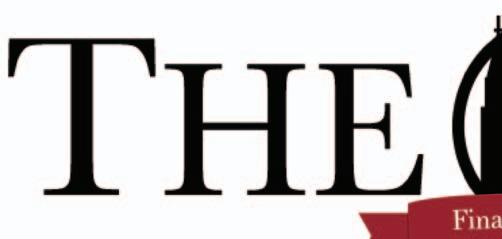
Between April 23 and April 26, The Heights informed the University that
“I stand by our reporting and am confident that the article is entirely true,” Owen Fahy, editor-in-chief of The Heights and MCAS ’22, said. “Any omission was due to a source not responding by press time. Every individual and entity named for this story was given a minimum of 48 hours to respond.”
On April 27, Leahy published a statement responding to The Heights’ reporting. In it, Leahy revealed that he spoke to Dziak in the fall of 1997 about complaints made by members of the BC Chaplaincy before informing his Jesuit superiors of the situation. Leahy emphasized that he was not Dziak’s religious superior nor did the Province consult him about any subsequent assignments.
“The Heights made a crucial error in rushing to publish an article without obtaining all of the facts needed to present an accurate account of what transpired during Fr. Dziak’s time at Boston College,” Dunn said. “We referred The Heights to the USA East Province of Jesuits because Fr. Dziak is a member of the province and has had no connection with Boston College since he left in 1998.”
The East Province did not respond to multiple inquiries from The Heights ahead of the April 26 article. The Heights reached out to the Province’s office four times during that period: once on the evening of April 23, again on the morning of April 24, and twice in the afternoon of April 25. The Heights left three messages on the East Province’s main phone number across the four calls in advance of the article’s release.

“The refusal of the province to respond to The Heights and any other media inquiries on this issue is shameful and irresponsible,” Dunn said.
“They should have acknowledged Tim Ballard’s claim against Fr. Dziak with the Jesuit Volunteers International in Belize in 2004 as well as the action Fr. Leahy took in 1997 when issues regarding Dziak’s conduct arose at BC. They should have explained to The Heights that Jesuit assignments are made by the Province, and that Fr. Leahy and Boston College had no role in his placements before or after his time at BC.”
The East Province has not responded to subsequent requests for comment from The Heights. On April 28, The Heights emailed James Skurka, the East Province’s contact for advancement and communication.
On the same day, The Heights left a voicemail for both Skurka and the main Province office. A staff member for the East Province confirmed on April 29 that she had passed a message from The Heights on to the communications department. The Heights left another message for the main office on April 30.
Arts Fest Takes Over the Quad
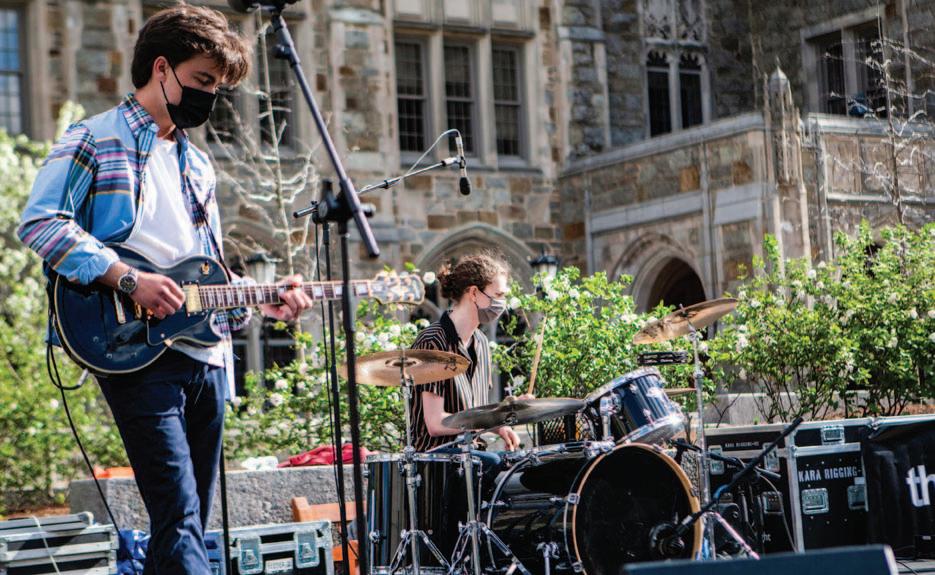
BC’s artists displayed their various talents over the weekend, taking advantage of the warm weather.
See Arts Fest, A5
Class of 2021 Reflects on the Past Year
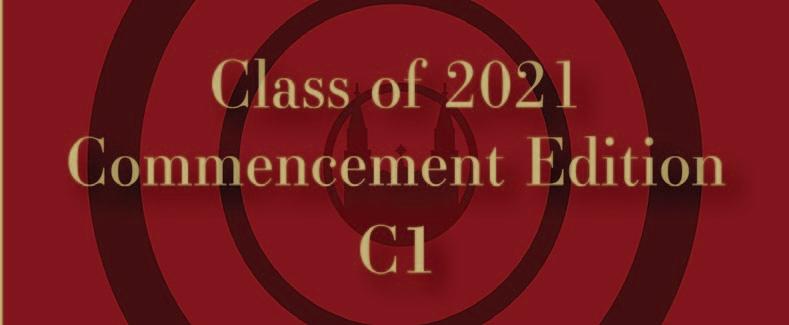
spective on what she values has shifted.
Although Kern was not able to have a “normal” senior year, the lessons she learned are something that she will carry with her in the future, she said.
BY ANNA LONNQUIST Magazine Editor BY STEPHEN BRADLEY Assoc. Magazine Editor BY MC CLAVERIE Asst. Magazine Editor
For the past three years at Boston College, Megan Kern has lived in the fast lane, she said. Like many BC students, she sacrificed sleep and time with friends in order to take on more, both academically and extracurricularly.
But when COVID-19 struck the United States in March 2020, Kern, Lynch ’21, was forced to accept that she had to slow down. Now, as she goes about her daily habit of writing down her favorite parts of each day, her per-
Similarly, many seniors had to cope with the loss of what would have been the culmination of their BC experience—senior year and the traditions that come with it. Though traditions such as Mod weddings, Senior Week, and Commencement may not exist in their typical forms, many seniors have said this past year on the Heights has provided unique opportunities for learning and personal growth.
COPING WITH THE UNKNOWN
After BC students were sent home last March due to COVID-19, many current seniors said they struggled to imagine what it would be like to return to a modified campus. With so many unknowns surrounding the return to campus for the fall semester, current seniors experienced a range of emotions.
“I think things came in waves—kind of like a grieving process,” Tatiana Niebuhr, MCAS ’21, said. “I knew deep down already that my senior year was not gonna look like the way that I wanted it to or the way that we were promised to have our senior year look like.”
As the pandemic continued, current seniors became increasingly aware that things were not going to return to normal for some time.
“So, like, right when the pandemic hit we were like, ‘Oh, we’ll see you next year at the tailgate and the football game,’” Czar Sepe, MCAS ’21, said. “I mean, it was stupid, but, like, we kind of didn’t know yet.”
As the spring progressed, students became nervous about BC’s ability to reopen in light of other universities across the country announcing plans to operate remotely, Ellie Rueve, MCAS ’21, said.
Flowers Flaunts Skills on the Field
E THAN O TT Asst. Sports Editor

Overtime, Boston College ball.
Phil Jurkovec adjusts his armband and looks ahead to the 25-yard line at his three receivers. Closest to the right sideline is Zay Flowers, Jurkovec’s go-to receiver. Jurkovec takes the snap from under center—four steps back, two shuffles forward—and lets the ball fly.
Flowers hadn’t played in an overtime game since his junior year of high school. Against Pittsburgh, that fact didn’t matter.
He sprints downfield with his signature speed, looks up when the grass below his feet turns maroon—signaling he’s found the endzone—and leaps over one defender with another at his back. Five seconds after the snap, the ball is in Flowers’ hands.
The scoreboard flashes 30-24, and BC has the go-ahead score it needs.
“I’m pretty good at overtime,” Flowers said in his post game press conference.
In BC’s overtime win against Pittsburgh, Flowers and Jurkovec may as well have been the only two Eagles on the field, as the duo accounted for all but six of BC’s points.
When he entered the locker room after the game, Flowers had assembled one of the best performances of his season with 162 yards and three
touchdowns, one of which won BC the game.
Nonetheless, Flowers remained levelheaded after the game, as he did all season and has throughout his football career.
“I knew it was coming,” Flowers said in that press conference. “That’s why I made the play.”
Four days later, Flowers’ name was on the 2020 Biletnikoff Award watch list honoring the best receiver in the nation.
His success, however, was not limited to one contest. By exceeding expectations game after game in 2020, Flowers earned The Heights ’ 2020-21 Breakout Male Athlete of the Year honor.
See Seniors, A6
IKRAM ALI / HEIGHTS EDITOR
See Flowers, A11
3,
BC’s seniors look back on a unique last year of college. The receiver is slated to lead the 2021 squad.
Monday, May
2021
INSIDE METRO: Art Market A new art market is running every Saturday at Copley Square............................................ ARTS: Campus Exhibit Student artwork was put on display from Thursday to Saturday across campus............. INDEX Vol. CII, No. 11 © 2021, The Heights, Inc. www.bcheights.com NEWS......................... METRO..................... ARTS...................... MAGAZINE............. OPINIONS................ SPORTS................... A6 A8 A11 A2 A4 A5 THIS ISSUE A3 A5 See Dziak, A2
Leahy writes that Jesuit leadership alone had authority over Dziak assignments.
UGBC Thanks Students With Giveaways, Meet &
B Y J ULIA L ANDWEHR Heights Staff V ICTOR S TEFANESCU Asst. News Editor
Ice cream trucks, mascot sightings, and lawn games might be typically associated with a carnival rather than a college campus.
But, this week, Boston College’s campus has been filled with fun activities and giveaway events—one of these being a discounted trivia night at BC After Dark.
“I was actually surprised,” said Andrew Vagra, MCAS ’24, who attended a 50 percent off night at the on-campus restaurant on Friday. “The entire place was packed inside for the entire night. There were no open tables, so I was v ery surprised to see that. But it was great, and I’m glad we have something like that on campus.”

To close out the semester and thank BC students for their dedication to following University COVID-19 protocols, the Undergraduate Government of Boston College, in partnership with BC Dining and BC Athletics, offered a series of campus-wide events, meet and greets, giveaways, and more in what they dubbed “Thank You Week.”
“The student body, and really the entire BC community but especially the students, put in a tremendous amount of work and a tremendous amount of effort to stay safe and ‘Keep the Heights Home,’” former UGBC President Christian Guma, CSOM ’21, said. “So, we wanted to recognize that, and again reward students for the job that they did.”
Thank You Week began on April 24 with a BC football game and discounted pricing at BC After Dark, and rounded out the following Saturday with more BC After Dark discounts and trivia.
The trivia drew UGBC Communications Director Jessica Paszko, MCAS ’22, to stay on campus Friday night.
“I love trivia,” said Paszko. “I go to Cityside trivia a lot, won my freshman year trivia in Newton basement, so I came back to win some more trivia.”
For Vagra, it was the cheap prices that motivated him and his friends to go to the restaurant.
“It was really easy to get all my friends together to do it and convince them because everything was so cheap and it was right on campus,” he said.
Paszko said the atmosphere at BC After Dark was impressive on Friday, compared to last time she went during its opening weekend.
“I felt tonight was like very similar to like the Cityside bar atmosphere at trivia, which I really liked,” Paszko said. “People were like, you know, more energetic than usual, and that’s kind of like the scene I was hoping for.”
Vagra also said that the energy was great at BC After Dark on Thursday.
“It was a great vibe,’’ he said. “Well, among us freshmen, it was like a great way to, like, have fun with our friends and get our minds off of all this COVID madness.”
The academic week’s events consisted of discount vouchers to restaurants like El Pelόn Taquería, White Mountain Creamery, and Shake Shack, as well as on-campus lawn and board games. UGBC also gave out “I Survived the
Eagles Care Pledge” t-shirts.
BC Dining also contributed to these events, providing peanut butter and jelly sandwiches and cookies on Monday, an ice cream truck on Tuesday and Wednesday, and a walking taco pop-up inside the Rat on Thursday.
All of the food and treats were given to students for free, subsidized by UGBC.
After collaborating with Guma and former UGBC Vice President Kevork Atinizian, CSOM ’22, throughout most of this academic year, BC Dining was excited to be involved in Thank You Week, according to Megan O’Neill, the associate director of BC Dining.
“We don’t need our staff and I don’t have a job if students aren’t here, so it was really important for us to figure out ways to get students here, keep them safe, get the message out, and UGBC has been an unbelievable partnership in that,” O’Neill said. “So we also are thanking the students who are doing their part, making it until April.”
Beyond just a reward for students’ diligence, O’Neill said that events centered around food can bring people together.
“The best times for me [are] when I’m sitting out in the dining room and I’m listening to the students just being together and laughing, having fun,” she said. “That to me is, like, ‘Okay, this is why you do this.’”
UGBC also partnered with BC Athletics, who hosted a Sunday merchandise giveaway on Instagram for students, and scheduled opportunities on Monday and Tuesday for students to meet varsity coaches, like men’s hockey
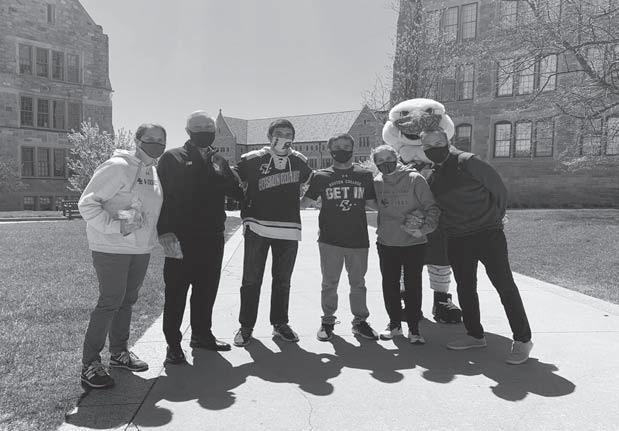
coach Jerry York and football coach Jeff Hafley.
“[Guma and Atinizian] presented it to us and we were very excited,” Associate Athletics Director for Marketing and Fan Engagement Jamie DiLoreto said. “We’re starting to hopefully turn a corner here and we’re getting towards nicer weather, to be outside more—we were provided some opportunities to thank the students, and our coaching staff jumped at it.”
The meet and greet opportunities should also build fan engagement going into next year, DiLoreto said.
Vagra said he hopes to see more in-person initiatives like it in the future.
“The whole [in-]person thing is tough right now, but in the future, I would love to see it because it was really fun,” he said. “[It was] just a good way to hang out with your friends and people.”
The event required a lot of time
and planning for Guma and Atinizian especially, Guma said, but the opportunity to see students happy made it all worth it.
“This year we really really stressed that every dollar we spend, all of our resources, are going outward toward the students, nothing is being used internally for UGBC, it’s all outward, and this week is the epitome of that,” Guma said. “Literally, we’ve labored and spent a lot of money, all for the students—it’s an investment [in] them.”
Atinizian also emphasized the importance of thanking students for their work this year.
“It’s great to see our students enjoying themselves and I’m thrilled UGBC could play a small part in that,” Atinizian said in a statement to The Heights. “The student body has done a tremendous job this year, and we ought to recognize them.”
Undergraduate Philosophy Journal Released on Monday
B Y E THAN R AYE Copy Editor
Dianoia , Boston College’s undergraduate philosophy journal, is a medium for philosophical minds across BC and around the world to come together and discuss their findings, according to Noah Valdez, the journal’s editor-in-chief.
Dianoia sort of occupies this place where if you wrote a paper for one of y our core philosophy requirement classes, you can extend your analyses there and potentially contribute to D ianoia ,” Valdez, MCAS ’21, said. “So that other undergraduates, not only on our campus, but all around the world, can sort of grapple with what you’ve either discovered or extrapolated upon.”
Dianoia , which is composed of several undergraduate essays, will be releasing its eighth issue on Monday, as well as hosting a digital symposium
featuring guest speakers from the journal’s recent publications.
“The digital symposium is going to be essentially a showcase of the fruit of this year’s labor,” Valdez said. “And what we’ll do is we’ll have four different speakers from six of our recent publications give a short presentation on the topic that they’ve published on, some matters that are important to them, and potentially some points of conversation for those that attend the symposium.”
The symposium will be split into two parts, with the first half dedicated to the speakers’ presentations and the second dedicated to a question and answer session that will give attendees an opportunity to talk directly with the speakers.
Valdez said that Dianoia is unique among undergraduate philosophy journals because of the variety of essays it publishes, including interviews
and reviews of recent philosophical books and articles.
Through these essays, Dianoia brings philosophy directly to an undergraduate audience, he said.
“I think if I could summarize Dianoia ’s main role in undergraduate philosophy, or even just in undergraduate institutions, it would really be in attempting to bring philosophy to an undergraduate level and see how undergraduates respond to it,” Valdez said.
Valdez also noted the significant growth of Dianoia in recent years. The journal, which accepts essay submissions from all over the world, received over 210 submissions this year, a 200 percent increase from its first issue in 2012.
“Aside from just being humbled, it’s a pleasure to be part of a project that is so cosmopolitan in nature, and we’ve come a long way, that’s for sure,”
Valdez said.
The COVID-19 pandemic has presented unique challenges to the publication process, Valdez said.
The onset of the pandemic last spring meant that no physical issues could be printed, which was a disappointment, he said.
“Last year … we weren’t allowed to have a print copy, which is always kind of a letdown because the print copy, you know, is sort of the culmination of everything you’ve been working towards the entire year,” Valdez said.
Fortunately, 100 copies of last year’s issue will be printed alongside this year’s issue and will also be exhibited during the symposium, Valdez said.
He also noted the strength of this year’s issue and said that all the essays provide unique and interesting philosophical commentaries.
“I think that [all the essays] are unique in their separate ways, and that
they’re all innovative and thought-provoking in their various disciplines,” Valdez said.
Valdez said that for him in particular, Dianoia has been an invaluable experience that has helped shape his undergraduate career.
Dianoia has meant everything to me,” Valdez said. “I think that as great as classroom experience and learning can be with professors, the majority of my educational career at BC has been through Dianoia .”
Valdez recommended that anyone with an interest in a particular field of study get involved with one of the many undergraduate journals on campus.
“I would recommend, if not Dianoia , just participation in any undergraduate journal, given how much you can potentially learn and the friendships and relationships that you can cultivate as well,” Valdez said.
BC Says the Silence of Jesuit East Province is “Negligent”
The April 26 article reported that Leahy learned about Dziak’s inappropriate and emotionally manipulative behavior—but not sexual abuse—in two stages.
The first stage was during the 1997-1998 academic year when members of the BC Chaplaincy told Leahy that students had complained about Dziak’s troublesome behavior.
“Fr. Dziak’s conduct at Boston College was abusive, as it involved unacceptable, petulant, emotionally controlling behavior,” Dunn said. “But it is important to clarify that there were and have been no allegations of sexual abuse against Fr. Dziak while he
was at BC or Loyola University in New Orleans. His emotionally controlling conduct at Boston College warranted the action that Fr. Leahy took in 1997.”
The second stage detailed occurred in the year following Dziak’s departure. In the summer of 1998, Matt Stautberg, BC ’99, met with Leahy and told him about Dziak’s “inappropriate” and “childlike” actions. That fall, Stautberg wrote Rev. Robert Levens, S.J., then the provincial of the New England Province of the Society of Jesus, a letter about Dziak’s emotionally abusive behavior, a copy of which he sent to Leahy.
In March 1999, Beth Eilers, BC ’97 and BCSOE ’99, also copied Leahy on a letter to Levens expressing concern
that Dziak was able to stay in contact with BC students through the Ignacio Volunteers program.
Leahy said in his statement that he met with students about Dziak in 1998 and again told the Province about their complaints.
“As anyone who has worked with Fr. Leahy knows, he is a person who takes his priestly vows with the utmost seriousness and has no tolerance for abusive priests or anyone whose conduct does not meet our standards,” Dunn said.
Eilers also collected testimony from students, staff, and faculty detailing numerous examples of Dziak’s misconduct, including emotionally manipulative relationships with BC
students. The April 26 article reported that these concerns were sent to Levens in the 1998-1999 academic year. Eilers also told Rev. Jim Webb, S.J., who as the regional superior of the Society for Guyana-Jamaica oversaw Dziak’s new assignment, that he should not be working with young students.
Dziak has also been accused of behaving inappropriately toward students at Loyola University New Orleans, where he served as the university’s vice president for mission and identity and the director of the university’s Jesuit center, according to nola.com.
Ballard’s attorneys told nola.com that the accusations against Dziak are
consistent with the allegations from BC and the Belize trip.
“I have talked to Tim Ballard, whom I respect greatly, and offered him my prayers and support,” Dunn said. “He is a survivor, and he deserves for the USA East Province of Jesuits to acknowledge his claim and the pain and suffering he is experiencing.”
Dziak announced his departure from Loyola after a year-long sabbatical, and in May 2020 he became the chaplain at Le Moyne College in Syracuse, N.Y., according to nola.com. The current provincial of the USA East Province, Rev. Joseph O’Keefe, S.J., has since removed him from his position at Le Moyne, pending an investigation.
THE HEIGHTS A2 MONDAY, NOVEMBER 11, 2019
MONDAY, MAY 3, 2021
Greets
BC Athletics coaches and UGBC leaders pose for a group photo with Baldwin on the Quad. COURTESY OF TORY BOYLE
Dziak, from A1
BY AMY PALMER Asst. News Editor
On Thursday, the Student Assembly (SA) of UGBC voted against an act that allows for the consultation of previous UGBC members. It also passed an act concerning official UGBC resource guides and confirmed five nominees for the 2021-22 academic year.
Dennis Wieboldt, SA representative and sponsor of the first act, said the amendment would give those who have previously held leadership titles on UGBC an opportunity to participate more formally during meetings.
“I think this is something that we saw last year—that it’s always good to promote consultation with people who’ve been in UGBC before and who just aren’t participating in future years,” Wieboldt, MCAS ’22, said.
Ivy DiBiase, SA representative and MCAS ’22, said she doesn’t like the idea of giving former members more of a voice than the general members of the student body.
“I don’t think we should be, like, privileging people just because they’ve been involved in the past,” DiBiase said. “Like, obviously there’s a reason why they’re
not involved in the future and so, like, I just don’t really think that makes a lot of sense to me.”
Vice President Gianna Russi, MCAS ’22, said the process in which this proposed amendment was brought to the SA was flawed as it was created without collaboration and consultation from the current SA or future leadership.
Russi said this proposed amendment would allow continued executive board participation beyond the expiration of terms of office.
“This amendment would undermine the voices of students that would create an ever-increasing list of emeriti, who SA members would have to debate with on legislation,” Russi said.
Wieboldt motioned to table the proposed amendment, but the motion was denied and a roll call vote was taken, where the proposed legislation did not pass.
Wieboldt expressed his disappointment over the SA denying his motion to table the act concerning multi-year consultation and the subsequent vote against the proposed amendment.
“I’m dismayed at the fact that it went the way it did because if anyone had any issues I would have been happy to table it at the beginning of the meeting,” Wieboldt said.
“Really wasn’t meant to cause a stir, just genuinely thought it would be a good idea to have a more formal role for people who had taken leadership in UGBC in the past.”
The second amendment proposed at the meeting creates official UGBC resource guides, including a general BC resource guide, an AHANA+ student guide, a students with disabilities guide, an LGBTQ+ student guide, a Montserrat student guide, and a multi-faith student guide. The act passed with 14 yes votes.
The SA also confirmed five nominees for positions for the next academic year, including the chair of the AHANA+ Leadership Council (ALC), three SA representatives, and the director of the division of environmental sustainability.
Lubens Benjamin, CSOM ’23, will serve as the chair of ALC. Benjamin said this position is the next step for him in making sure student voices continue to be heard and creating an inclusive environment on campus.
The SA confirmed Naziha Bugazia, MCAS ’22; Sophie Hoeltgen, MCAS ’23; and Tyler Gollin, MCAS ’23, as SA representatives for the 2021-22 academic year. Bugazia, Hoeltgen, and Gollin will serve as representatives for transfer students, student athletes, and first-generation stu-
dents, respectively.
The SA also confirmed Giovanna Eichner, MCAS ’23, as director of the Division of Environmental Sustainability.
James Freirich, SA representative and CSOM ’21, questioned Eichner’s position on divestment.
Eichner said she was aware of the various approaches to divestment on campus and hopes that UGBC will be able to take a different approach.
“So we would probably leave divestment to CJBC, but if possible, I think the division would do a good job in allowing us to have more contact with administration, because right now, I know that EcoPledge, Real Food, all those groups don’t really ever talk to people in the administration,” Eichner said.
Freirich said Eichner should focus on making tangible change rather than working with administration.
“I frankly think it’s a waste of time to try to pursue admin. You guys won’t get anywhere on that front,” Freirich said. “I think, if anything, the thing that I’ve been trying to harp on is just reinforcing, trying to get, you know, tangible, so to speak, groundwork.”
SA representative Samuel O’Connor, MCAS ’21, questioned Eichner on her
support of BC’s lawsuit against the City of Newton regarding Webster Woods.
Eichner said that at the time she was supportive of the decision to let the state reclaim Webster Woods, but that she is willing to learn more and change her position. Although the division will be interested in things like Webster Woods, Eichner said that will be mostly left to eco-groups.
“I think we’re talking more about initiatives that will create tangible change on campus that we know can be done, and that will actually take big steps instead of just things being done already by the different eco-groups,” Eichner said.
The meeting concluded with a discussion in which members shared their thoughts on the toxicity and circumvention of rules within UGBC.
Wieboldt said that for next year, he hopes everyone on UGBC will keep in mind the spirit of camaraderie that they should have.
“I think it’s something that we’ve struggled with over the last two years, but I think we make strides sometimes and then take four and a half steps backwards, and then take nine steps backwards, so hopefully next year we can, you know, get off on a better foot,” Wieboldt said.
Newton Sees an Increase in Public Park Attendance
By Julia Remick Metro Editor
Newton parks have served as a respite for residents throughout the pandemic. No matter the season, Newton Parks and Recreation Commissioner Nicole Banks said she has seen an increase in the number of Newtonians frequenting these public spaces.
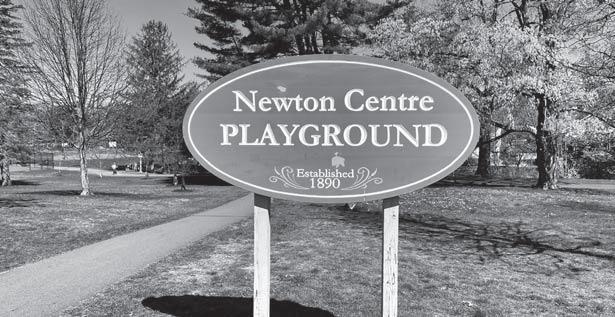
“Parks in general during the pandemic [have] been very, very popular,” Banks said.
“They’ve been a space for our community members to be able to be outside, which has been a little bit safer for the community members.”
For those without a large yard, Banks said, the parks serve as a space where people can safely spread out and spend time outside.
Although there are not official numbers indicating an increase in park attendance, Banks said the department has seen an increased need for services in the parks, such as trash removal, which reflects an increase in park usage.
“We’ve increased our number of trash pickups during the week,” Banks said. “We’ve also made sure to have, every weekend, trash pickup coverage because we will just see those bins overflowing if we don’t keep up with that.”
Trash is removed every day at the busier parks, Banks said.
“Usually, when the summer season ends, so the end of August, we would stop our weekend pickup, and we kept that going right through the winter, so I think we just didn’t see that seasonal falloff happen,” Banks said.
The parks with more amenities have been more popular, according to Banks. With a new playground and field, The Highlands has been popular, as well as Au-
burndale Park—known as “The Cove”—and Franklin Elementary School. Cold Spring Park, with its new nature trails and orienteering, has also been popular, according to Banks.
Orienteering is a new element that the department has added to Auburndale Park, Cold Spring Park, Kennard Park and Conservation Area, Nahanton Park, and Edmands Park. Visitors can download maps of five of the parks and practice navigating and reading maps in designated areas, Banks said. The parks also held programs to teach people about orienteering and how to read the maps, according to Banks.
“It’s a little bit like a scavenger hunt-type activity, just a really fun way to get outside and have an activity while you’re walking on the trail,” Banks said.
The department has also seen a need for more picnic tables, according to Banks. She said that they have also been pushing to have accessible picnic tables added to the parks.
Activities that can be done while social distancing, such as tennis, pickleball, and golf, have also been popular, according to Banks.
“We just saw a huge increase in those programs, because, you know, you have individual equipment, and you’re outdoors and can space out,” Banks said.
The increase in park attendance has not been limited to a particular age group, according to Banks. Banks said she has seen entire families riding their bikes together during the day, which she said is due to residents having more time to spend outside as a result of the pandemic.
Newton Parks has also assumed the new role of supporting local businesses, according to Banks. The department helped to sup-
port the Newton Al Fresco dining project by providing picnic tables. These tables, which were painted by local artists, helped local restaurants to expand their outdoor dining.
“We’re pretty used to working with community members, and nonprofit organizations, but we really got to connect with our local businesses as well,” Banks said. “I would say we probably, for the first time, saw some private businesses looking to use the parks that typically would not.”
The parks helped businesses to organize outdoor yoga and an outdoor performance for a local dance studio, Banks said. Scouts and youth sports groups also used the parks to safely meet, while Banks said the department helped to ensure that the groups were abiding by state safety guidelines.
Throughout the pandemic, Banks said the department has focused on activities that can be done outside, as well as added virtual programming.
The older adult programming, such as the fitness and social programs, transitioned to Zoom, Banks said.
The Newton Athletes Unlimited program for residents with special needs also moved online, while maintaining the same schedule of meeting three times a week with three activities per day, Banks said.
“A large part of those recreation programs are about being social,” Banks said. “But the input that we heard of just having a way to connect, and, you know, something to do each day was so important to those individuals, so that was great to see”
The department is offering a variety of summer programs and camps. The Summer Fun programs are similar to the park’s traditional camp programs, but have been modified to meet COVID-19 guidelines,
according to the Newton website. Daily activities include sports, arts and crafts, creative writing, outdoor games, and more, according to the website.
The park will also offer golf clinics and speciality camps, such as table tennis, needle felting, super science, and Minecraft camp, according to the website.
“We’ve also been able to offer increasing programming, so we really focused on working with our health and safety department, to review, you know what size could our group be, how would we manage mask wearing, distancing cleaning of equipment,” Banks said.
Registration for summer programs, which Banks said typically reach capacity, has been open for Newton residents since March 17 and will open to non-residents on Monday.
“So we expect to reach full capacity,” Banks said. “And we’ve I think had a very strong interest, you know, in coming back to in person activities like camp.”
Although interest in camp registration has been high, Banks said they are still
in
“Staffing is a challenge, we are actually doing fairly well on our camp and programming staff but we are very much struggling for aquatic staff,” Banks said.
Banks said she is hopeful that the department will receive more applicants because the aquatic facilities depend on a strong staff. COVID-19 safety protocols will be in place and the staff will likely be vaccinated by the time of their employment, Banks said.
“One of the things we’re focusing on with our staff hiring is doing a lot of trainings this year, so that if we do have new staff joining us, you know, we’ll give them a good, good onboarding and training system before they start for the season,” Banks said.
Banks said that the department is fortunate to have elected officials in the city that support the parks and open spaces.
“And this has really just sort of been an added bonus, you know, to have these spaces and be able to use those during the pandemic,” she said.
Vendors Come to Boston Open Market at Copley Square
By Josie McNeill Asst. Metro Editor
The Boston Open Market, a new weekly arts market hosted by New England Open Markets, opened on Saturday and is offering artists a chance to showcase their art and reconnect with customers at Copley Square.
New England Open Markets have been
“And this is my first time showing with them. You can just see the location, and everybody wants to get out, you know, and I think it’ll just be great for everyone.”
The Boston Open Market is set up as a series of tents around the greenery at Copley Square. Each business, ranging from jewelry designers to garment upcyclers, has its own tent to promote its art.
along the way that had beautiful collections that I actually started selling for them.”
According to Gold, at the start of the COVID-19 pandemic, many artists like Gold, who would normally sell their crafts at local markets, were forced to shift their businesses online. This change makes the experience of selling impersonal, Gold said.
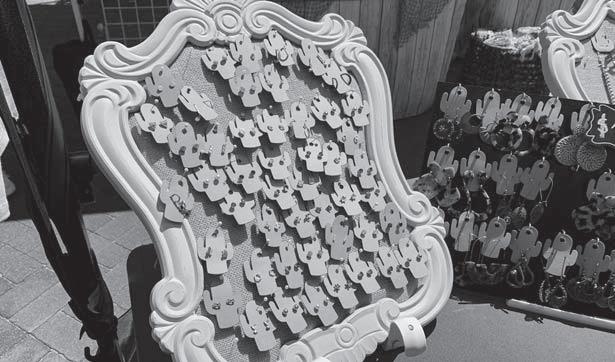
“It was kind of isolating just to sell online all for like a year,” Gold said.
While Gold started selling her work online because of the pandemic, other vendors, such as Ashley Stebbins from Plantcycled, began their businesses on websites like Etsy before moving to markets.
“When I was in college, I started making my dinosaur planters,” Stebbins said. “I originally made one for myself, and it turned into a big success with all my roommates and my friends and everything.”
Stebbins’ dinosaur planters are made by cutting a piece of plastic out of a dinosaur figurine and inserting a plant, just like placing a plant into a pot.
Other planters available at her shop are also made from materials that could be found around the house.
her to branch out with new products over the years.
“It’s come to now doing conventions and doing more pop culture, Pokemon, anime-themed items,” Stebbins said.
Stebbins said she is glad that she is able to return to selling her items in person because she missed the personal connections she made with her customers.
“It’s meeting all the new people, the infinite people,” Stebbins said. “It’s getting out there [and] being social. It’s also nice being outside, especially after staying inside for a whole year. … It’s been my favorite thing so far.”
Vendors at the Boston Open Market also come from a variety of locations, including Analia Knauer from Argentina.
Knauer’s shop, Krikraf, specializes in handmade pouches, purses, and tote bags. Many of these products are printed or embroidered with geometric patterns or graphics of public figures such as Frida Kahlo. At the open market, she also sold earrings, necklaces, and masks.
them, and said she is happy to sell her items, plastic bag–free, at the market again.
Another vendor, Richard “Luhne” Bonasoro from Backyard Soap Company, said he missed the opportunity to sell at markets when he shifted his focus to his online business at the start of the pandemic.
“Because, you know, this pandemic has been going on for a while, and not being at markets for almost two years was kind of a bummer,” Luhne said. “So that’s my favorite thing. I’m just happy to be back.”
Backyard Soap Co. is a vegan soap company based in Massachusetts. Luhne, a chef by trade, started making soap eight years ago because he said he loved making things from scratch.
“So I got into making soap, and it was kind of one of those projects that just stuck, and then I started giving it out,” Luhne said.
He originally started just making soaps for his family and friends, but then expanded to markets around Boston.
bringing arts markets to Boston for over 17 years. But, with its new partnership with the Friends of Copley Square, the company was able to bring the Boston Open Market to Copley Square.
“I’ve always wanted to be part of the New England Open Markets,” Gretchen Gold, owner of Wish List Vintage Apparel, said.
Gold’s business focuses on vintage apparel, jewelry, and shoes. Her shop has an array of vintage items, including pins from the ’80s, cut-off Levi shorts, and Hard Rock Cafe t-shirts.
“I got in the consignment business about 20 years ago and just fell in love with it,” Gold said. “And I met a lot of collectors and people
“We specialize in upcycled materials, planters, terrarium made from just your average, [and] standard everyday items that are normally thrown out, but they’ve been repurposed to give a new love and life,” Stebbins said.
Stebbins said selling on Etsy helped
Although Knauer has been sewing since she was 14, her business was only a year old at the start of the pandemic, which she said made it difficult for her to adapt.
She also said people were afraid to touch her items at her shop because of the pandemic, so she originally covered them in clear plastic bags. This inability to touch the products made it harder for Knauer to sell
“I started in SoWa in the South End, and then for years I was doing the Greenway,” Luhne said. “And now we’re in Copley. This is our first open market here today.”
The Boston Open Market will be open every Saturday from 11 a.m. to 5 p.m. from May through Nov. 1.
“I love the location,” Gold said. “And I love the energy. I love the people, the different types of vendors. You know, it’s just, it’s beautiful.”
THE HEIGHTS A3 MONDAY, MAY 3, 2021
SA Confirms Five
Resource Guides
Nominees, Proposes
need of lifeguard and swim lesson instructors, particularly at Gable’s Pool and Crystal Lake.
JULIA REMICK / HEIGHTS EDITOR
Newton Centre Playground has ammenties including tennis courts and basketball courts.
JOSIE MCNEILL / HEIGHTS EDITOR
Analia Knauer sells an array of earrings from her booth at the market.
Renowned Boston Chef To Open Restaurant in Newton
By Francesca Giangiulio Heights Staff
Paris, New York, Bangkok, Nantucket, Boston, and now Newton are all locations where Douglass Williams, chef and owner of MIDA in Roxbury, is sharing his expertise of cooking deliciously simple Italian cuisine.
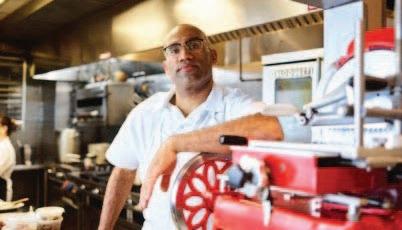
Williams is not only expanding his restaurant, but also his mission of helping others and building communities as he prepares to open a second MIDA location in Newton this June. Williams is one of 10 recipients of the prestigious 2020 Best New Chefs award from Food & Wine Magazine and is being named a James Beard Award semifinalist.
doubles as a social meeting place that isn’t in some obscure part of the city. Everyone should be able to enjoy fine food and connect with the people around them, he said.
“When you have a town like Roxbury, you have all of the culture built in,” Williams said. “You just have to nourish it, till the soil a bit and make sure you’re bringing all the things from the bottom of the surface to the top.”
Williams said he continues to learn from his customers and is changed by the people he meets every day. Williams said that he feels a responsibility to do something that makes others want to do more, such as fostering improvements in the neighborhood and inspiring people to build more
customer base, according to Williams. He said the food will be very similar to the original MIDA menu but with some new additions like an expanded antipasta menu, vegetarian lasagna, and a variety of housemade pizzas. Williams will be keeping fan favorites like the gnocchi cacio e pepe, which he said is his favorite dish to cook for its “simplicity and crowd-pleasing ability.”
“It is a winner for everyone and allows this magic to happen that transports people both those who have traveled here from Italy and people who have never had a gnocchi before,” Williams said.
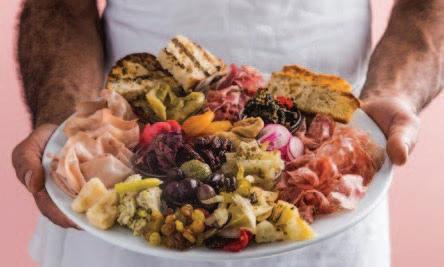
Williams said that a restaurant needs more than just good food to be successful. The customers’ energy in the restaurant is largely dependent on the service and how the staff interacts with them, Williams said. He said the restaurant staff is extremely important and at the end of the day, is what really makes the restaurant.
“A restaurant is a window into a neighborhood and what it wants to be,” Williams said.
As a result, Williams said he wanted to expand to Newton because he saw a need for more restaurants and things to do in the up-and-coming town.
entire class period, in 10 minutes. He said the other students were struggling, so he began to teach them and demonstrate the recipe for the class.
“Once I realized I can do my work, teach others, and enlighten them and make my teacher’s life easier, that was my a-ha moment like, ‘Yeah, this is what I need to do,’” Williams said.
His home economics teacher would let him pass out books; prepare the mise en place, a French culinary phrase that refers to the setup required before cooking, for the next class; and come to the classroom between periods and during homeroom to complete extra projects.
As a self-proclaimed “natural teacher,” Williams said he knew that wherever he ended up after high school, teaching had to be involved. It was non-negotiable, he said. Even back then, Williams said he knew he wasn’t going to go the traditional college route and wanted to pursue something creative, but just wasn’t sure what.
succeed, Williams said that he felt like he had only one shot.
After graduating high school, Williams attended the Academy of Culinary Arts at Atlantic Cape Community College in Hamilton, N.J. where he was able to travel the world, training in different countries and refining his skills. He said he had never been out of the country before, so traveling for culinary school was like his version of a “college experience” and his first sense of what it was like to have the freedom of living on his own.
Williams trained at many Michelin star restaurants during his time abroad and said his experiences there inspired the energy he hopes to bring to his restaurant MIDA.
“I love the excitement and what that brings at this level of cooking, and I want to make sure I bring that back to MIDA,” Williams said. “I want MIDA to feel European.
I want it to feel like you could find anybody there, friends, congressmen, people running for mayor. Everyone comes in here and that’s how a neighborhood restaurant should feel.”
While training in Paris in 2012, Williams said he had a “wake-up call” to settle down with his then-girlfriend, and now-wife, in Boston and open up his own restaurant.
Williams opened his first restaurant, located in the South End, in 2016 when he was 32 years old.
“I saw all these young chefs opening their own restaurants and doing all this awesome stuff, and I was like, ‘I should be doing that right now for myself,’ and honestly, I got a little frustrated—I was like, ‘No I’m gonna get back to Boston, I’m gonna find a partner, I’m gonna find some money, I’m gonna find a location, and I’m gonna open a restaurant,’” Williams said.
Williams said he strives to give his restaurants an elevated, yet homey neighborhood feel and that he chose the original location for MIDA on Massachusetts Ave. between the South End and Roxbury for the location’s rich history and culture.
Williams said he believes Roxbury has been underserved for many years and deserves more attention.
“It feels like there’s a lot of responsibility to carry on into the future and for people to see [the neighborhood] when they walk by or come out of the restaurant and have a great meal,” Williams said. “When you have an incredible meal, you’re more likely to want to move there and put down the anchor and say, ‘I could rent an apartment here because my favorite restaurant is here.’”
Williams said he believes it should be normal to have a phenomenal restaurant that
businesses.
“You should come out [of the restaurant] as a better person and someone who sees the world differently—that equals a neighborhood restaurant because that’s what your neighborhood should do for you,” Williams said. “It should be something that is not just this static thing. It should be blooming, blossoming, and evolving.”
Every night at MIDA, the sunset shines through the floor-to-ceiling windows and dots of white light dance across the restaurant from the reflections of the Prudential Center windows, whose top floors are visible from the restaurant’s tables. The moving beams and golden hour glow beautifully illuminate the house-made pasta that arrives at the table, still steaming with the rustic smell of fresh tomatoes and nutty, melted parmesan.
“It just feels ideal, like New York or Paris, the corner of the world in the most cosmopolitan, refreshing, energetic, youthful way without any bit of extra,” Williams said. “Just the right amount of all the things that people who love food like.”
Williams said he wants to create this feeling on a whole new level at the new MIDA location in Newton. Since the Newton location is in a brand new space, Williams said he was able to customize the restaurant more than the original MIDA and create a specific personality and energy.
The new location will have a larger dining room, two outdoor patios, and a larger kitchen to better accommodate his fast-growing
Williams said the Newton demographic is often thought to be older, but he believes that is completely untrue. Williams wants to break down the old stereotypes and misconceptions to expand people’s view of the community and make everyone feel like they belong and can start a life in Newton.
“There’s more to be cultivated: young adults, college students, new families, small business owners,” Williams said. “There’s a whole new demographic of young, diverse people moving [in], and I want to be ahead of the curve. … I want to be a part of the magic of expanding a neighborhood and diversifying the culture and environment.”
Everything Williams does is to help others and the community around him. He said there’s almost nothing better than the satisfaction he feels from knowing he’s making other people happy with his food.
“It’s not just about being skilled,” Williams said. “It’s about wanting to help others, and once you start adding all these other layers, that’s how you reach that next level, that’s how you get the Pulitzer, the genius grant, and all these things that seem unreal.”
The same spirit of generosity is embodied in the name of the restaurant, MIDA, which is Italian for “he/she gives me” and is symbolic of Williams’ desire to give back to the community.
Williams, who grew up in Atlantic City, N.J., said cooking came naturally to him with a father who was a chef and a mother in the hospitality business who loved to cook.
Even though his mother taught him to cook at a young age, Williams said he first realized his talent for cooking in his high school home economics class. Early during the course, Williams completed his assignment, which was supposed to take the
His life then took a turn when he was diagnosed with Crohn’s disease at 16 years old. He was forced to completely change his teenage-boy carb-crushing diet of five bowls of cereal a day and pay strict attention to what he was eating. Even though this was mentally discouraging, he said it helped him immensely in refining his palate.
His doctors also told him to chew every bite 30 to 40 times to break down the food for his stomach, which helped him think about what he was eating on a micro level.
He started to notice the intricate details of restaurant food—the difference between fresh and old eggs, different textures of cheeses, the juiciness of burgers, and when items were forgotten and left in the fryer or freezer for too long.
With his creativity and natural cooking ability, he said culinary school seemed like his best option.
“I told my mother, ‘I just want to do what I love,’” Williams said. “I didn’t really want to just go into a job or go to college and spend all the money to maybe [end up] doing something else. Everyone has the right to change their mind, but I knew what I wanted.”
After watching his mother save up her whole life to give him the opportunity to
While awards are among Williams accomplishments, they are not the focus of his work. He said he works to help others and positively impact the community, all while creating happy memories for his customers.
“That’s what I’m most happy about doing for others. All those memories live forever for them and that’s the thing that keeps me most happy,” Williams said.
Williams says that no matter what you pursue you should be “completely obsessed and absorbed with your profession.” He said that having tenacity, fearlessness, and believing in yourself will get you wherever you want to go in life, but you also have to love what you do.
“Beyond everything, beyond training, glamour, magazines, and the restaurant, the only thing that came about was being fearless, like dead-eyed fearless, and doing it with compassion,” said Williams. “I didn’t have any safety net to catch me or degree to fall back on. I knew if I didn’t step on the gas the entire way, I probably wouldn’t make it. You have to just jump out that plane, be competitive, and go in that race that never really seems to end. You have to keep going and keep pushing.”
Renovated Allen House Holds Performances in Newton
By Olivia Vukelic Heights Staff
After over eight years of renovations, the Nathaniel T. Allen House, located at 35 Webster St. in West Newton, has finished its transformation into a multi-purpose space now known as the Nathaniel Allen Center for Arts and Culture.
Since purchasing the Greek Revival style building in 2012, the Newton Cultural Alliance (NCA) has worked to renovate the home into a multi-purpose space, according to Adrienne Hartzell Knudsen, an NCA member.
The Allen Center will host theatre performances in a black box theater in the Allen House barn, as well as concerts and art exhibits, according to the NCA website.
This center held its first performance this weekend by the Newton Symphony Orchestra, Hartzell Knudsen said. The event observed social distancing guidelines and welcomed 14 guests, who were family members of the performers. Hartzell Knudsen said this was a “test run” for how the space will be used moving forward.
The house, which was finished being built in 1852, was formerly owned by Nathaniel Allen and functioned as a school that was founded by Allen and later operated by his daughters. It was added to the National Register of Historic Places in 1978 and is a Newton landmark, according to the NCA website.
“Nathaniel Allen was a progressive educator, arguably the way that Massachusetts has come from the spirit of leaders like himself,” Hartzell Knudsen said. “So, to continue this legacy of doing progressive, cutting edge things with the restoration and promoting diversity.”
With three floors, the first floor operates similar to a museum, with various facts about Allen’s life and the building hanging around the historic home. This floor also includes a 4,000 square foot renovated barn, which will function as a rehearsal and performance space.
Four different organizations have offices on the second floor, along with Allen’s famous bowling alley and restored science classroom. The basement contains a green room for performers, a catering kitchen,
and a newly renovated space for a small art gallery.
“The purpose for the organization was to have some office space, meeting or small rehearsal space, and then ideally to have some performance space,” Hartzell Knudsen said. “Lots of spaces don’t have that type of variety.”
The renovations, which finished in December 2020, amounted to $8 million. The Newton Community Preservation Program, the Massachusetts Historic Rehabilitation Tax Credit, the Massachusetts Cultural Facilities Fund, and private contributors provided grants for the renovations, according to the NCA website.
“When we started digging, a lot of things crumbled and everything was just not well put together but you couldn’t tell in advance until you exposed it,” Hartzell Knudsen said. “That part of the restoration process was far more difficult and both time- and money-consuming than we expected.”
The Junior League of Boston’s Designer Show House was held at the Allen House in 2016, where designers donated their services and materials to decorate the interior and
show their work to the public.
“The Junior League of Boston, which is a woman’s philanthropic organization, hosted a fundraiser program whereby they would find an interesting property and designers would bid on who would take which room,” Hartzell Knudsen said.
Choosing which parts of the building to preserve or restore depended on what elements could function properly by 21st century standards since the building needed to pass inspection, Hartzell Knudsen said.
“It was a very prolonged process and the preservation is a hybrid of both full preservation and adaptive reuse,” Hartzell Knudsen said. “We preserved a historic classroom where there is actually a school for girls in the 1940s but the rest of the barn space was turned into a small performance space.”
Various designers from across the Boston area combined their style with the history of the 7,000 square foot homestead to renovate the rooms. The modern kitchen on the first floor is influenced by French bistro design, and the contrast of the silk wallpaper and original paint of the dining room exemplifies the hybrid restoration process and adaptive
reuse.
After recently receiving public attention, Hartzell Knudsen said she is worried about the response of the Newton community to use the home for performing art, given its neighborhood location.
“We are an arts organization and a lot of arts are all about music or sound or speaking,” Hartzell Knudsen said. “So I think we have to be respectful and possibly use time or volume constraints.”
The NCA plans to host a public meeting to educate the community about how the space will be used, after being out of use for so many years, Hartzell Knudsen said.
Preservation Massachusetts awarded Hartzell Knudsen and the NCA the Paul and Niki Tsongas Preservation Award for their work on restoring the house, according to a statement from Mayor Ruthanne Fuller. The house is currently in the running for the 2021 People’s Preservation Choice Award.
“We felt very fortunate to get that and then be nominated,” Hartzell Knudsen said. “It’s a good way for people to notice since it was decaying for so many years and hasn’t really had activity.”
THE HEIGHTS
A4 MONDAY, MAY 3, 2021
SANDERS, WALSH & EATON CPAs, LLC CERTIFIED PUBLIC ACCOUNTANTS
PHOTO COURTESY OF DOUGLASS WILLIAMS
Renowned chef Douglass Williams is opening a second MIDA restaurant in Newton.
PHOTO COURTESY OF DOUGLASS WILLIAMS
The MIDA menu offers a piatto di antipasto with salumi, cheese, and vegetables.
Arts Walk Showcases Students’ Original Creations
assortment of sculptures.
stop on the
During the three days of the Boston College Arts Festival, students cutting through the lobby of Robsham Theater to grab a bite at Lower would have come across an expansive multi media display of student art.
The Arts Walk , an exhibit of BC students’ visual artworks, occupied the halls and walls of Robsham Theater, Maloney Hall, Devlin Hall, O’Neill Library, and Carney Hall from Thursday to Sat urday.

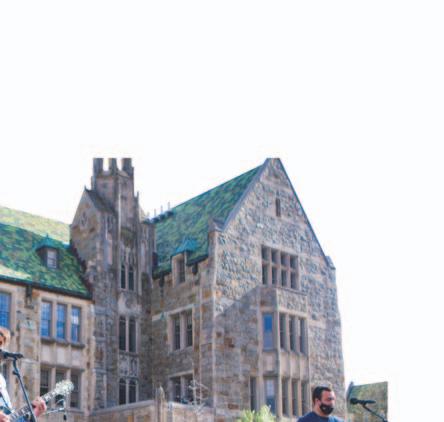
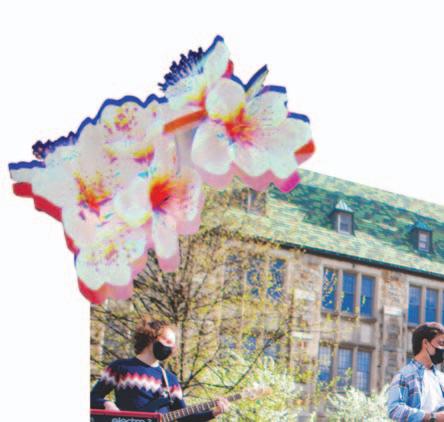

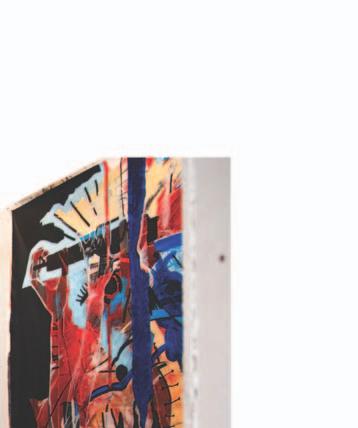
Roughly 70 pieces of art were on display throughout the buildings. For those who couldn’t attend the exhibit in person, the artwork is all available on the Arts Fest website.
Gray, wooden display boards were erected in the lobby of Robsham to exhibit students’ work. A diverse array of photography, oil and acrylic paintings, sketches, sculpture, and poetry were displayed on the walls.
Large-scale oil paintings–including “My Friend like Frida” and “Tears of” by Megan Stephenson, MCAS ’21–were surrounded by smaller pieces and tables holding a colorful

The lobby of the Division of Student Affairs office on the fourth floor of Maloney was filled with photographs of scenes from cam-
that were submitted by the office’s social media fellows.
On the fourth floor of Devlin, which houses the art, art history, and film departments, the walls were adorned with a conglomeration of
as not only a practical use of space, but also as an opportunity to share art beyond the halls of BC’s art department—exposing the BC community to even more of the creative
work done by its peers.
“We want to move [the visual arts] out of their little bubble and spread them out and have people walk around on campus,” Wang said. “And, you know, just meet people and bump into different people.”
Alongside some of the works were QR codes that visitors could scan to access video recordings and podcasts that Wang conducted with the student artists whose work was featured on the walk. In one episode, Zeke Coleman, MCAS ’23, talked with Wang about his desire to explore different forms of identity through his work.
His poetry and photographic portraits, a series titled What Color Am I? , are on display in the lobby of Robsham Theater.
This series features a somber Black man and is meant to examine the burden of having to either conform or resist the stereotypes forced on Black people by society, Coleman explained in his video interview.
In her interviews with the artists, Wang noticed that other students were also using their art to confront the challenges and tragedies of the past year—such as the pandemic, the Black Lives Matter movement, and the recent instances of violence against Asian Americans.
“Many of them [are] saying that art helps them to reflect on themselves and also on the world that they’re currently [living] in and the situation
around them,” Wang said.
Chloe Zhou, Lynch ’21, channeled her emotional reaction to the murder of eight Asian American women by a gunman in Atlanta, Ga., creating an acrylic painting entitled “Anguish” as a tribute to the victims.
Her painting hung on the white walls of Gallery 203 in Carney, depicting a nude woman with her face distorted in distress. Eight arms, which are meant to represent each of the victims, emerge from her body, stretching across the bright yellow canvas.
A virtual artist panel was also held to give students the opportunity to speak about the inspiration behind their pieces and their creative process.
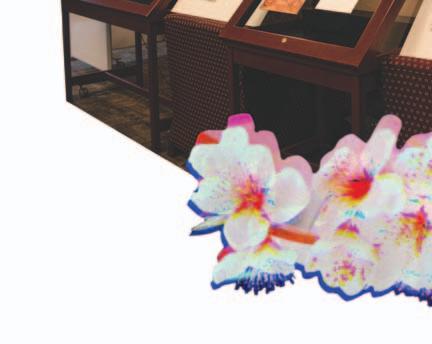
The catharsis that many of the artworks provide was not only available to the artist, but also to the students that wandered through the exhibit, Wang said. Students were able to observe the artists’ reflections on the events of the past year and consider their own experiences.
“It is also a good way to have some new perspective and new voice in life and on campus to [see] something new,” Wang said. “And people are really looking for the opportunity to meet new people and have a chance to reunite. And I think art, especially, [provides] this space where people can have conversation with their friends talking about art.”
Poster Exhibit Outlines History of Anti-Semitism
 BY ERIN PENDER Heights Staff
BY ERIN PENDER Heights Staff
From April 27 to May 5, the poster exhibit Anti-Semitism: A Very Long Hatred is on display in the O’Neill Library reading room and was featured at the Boston College Arts Festival. Curated by BC film studies director and professor John Michalczyk, the exhibit features posters chronicling the rise of anti-semitism with captions from students in this semester’s Propaganda Film class.
Graphics were provided by BC Graphics and Photography Services manager Christopher Soldt, and the exhibit was installed by Matthew Magardino, MCAS ’21; Olivia Grohe, CSOM ’21; Avory Xu, MCAS ’22; Nathan Yeung, MCAS ’21; Alexandru Craciun, MCAS ’22; and Dejah Roberson-Cosby, MCAS ’21. The coordinator of the exhibit is Associate University Librarian for Public Services Scott Britton.
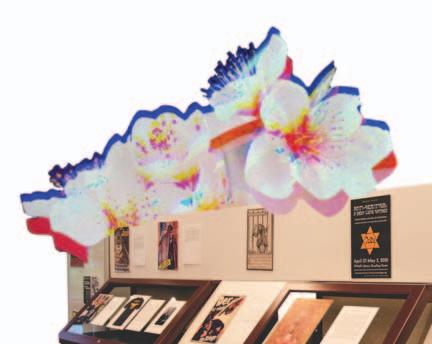
A number of posters hang against a white background in the reading room, most of which are from the period around World War II. One image is from medieval German historian Hartmann Schedel’s 1493 work Liber Chronicarum which translates to Book of Chronicles. The work depicts the burning of Jewish
people in medieval Bavaria for allegedly desecrating the host—what Catholics believe to be the transubstantiated flesh of Jesus Christ.
While the posters from the 1940s remind viewers of the rampant and menacing anti-Semitism that spread after World War I and into World War II, this poster serves as a reminder that such hatred for the Jewish people was not new.
On the contrary, it followed a pattern that had been in place for many years.
Christ. le from the 1940s viewers o f th e nacing anti-Semit after War I or ld tv e s mindsuc h or p eop l e t new. c oni t fo lpattern d b ee n r many years. y of the anti-Semitic a n d a posters f ocus o n y pical a b eard , a l arge nose, and , MCAS ’24 , describes in ion for a titled “This is a
Many of the anti-Semitic propaganda posters focus on stereotypical Jewish features, such as “a beard, a large nose, big ears, and long fingers,” as Peter O’Brien, MCAS ’24, describes in his caption for a poster titled “This is a Poison for Nations.” The Jewish man in the poster is shown sitting on a stack of
ambitious
will
skulls and counting his money, upholding the narrative of the money-hungry, overly ambitious Jew who will do absolutely anything to become rich.
The posters not only focus on stereotypes of the Jewish people, but also how they were characterized and blamed for
the figures of Winston Churchill and Joseph Stalin shaking hands as a Jewish face looks down over them. Reinsdorf said the Germans’ intended to show how Jews were to blame for the alliance between the Soviets and the British in World War II in this poster. Though the allies were the real enemies of the Nazis in the war, this poster attempts to villainize Jewish people as if they were the greatest threat to the Nazis and to Germany.
Unfortunately, the hatred and anti-Semitism prevalent in these older posters is not gone. Three photographs on the front panel of the exhibit depict events that have happened within the past five years. One image is of a man wearing a sweatshirt that reads “Camp Auschwitz” at the Capitol
Chemnitz, a city in Saxony, Germany. Phrases such as “Jewish pig, get out of Germany” were shouted at a restaurant in Chemnitz, revealing the anti-Semitic sentiment of the German far-right, as stated in the caption by Nathan Lee, MCAS ’21.
A third photograph, also from 2018, depicts a memorial at the Tree of Life synagogue in Pittsburgh, Pa., where 11 people were killed.
The writer of the caption, Dylan Migliore, CSOM ’21, also details how the conspiracy about a Jewish goal of world domination has been in existence for many years, beginning with Adolf Hitler and the Nazi party.
The attack at the Tree of Life synagogue was the deadliest attack incited against the Jewish community in U.S. history.
aspects of World War II. Jacob Reinsdorf, MCAS ’21, explains one such poster, titled “Jewish Plot Against America,” describing
Another photo from September 2018 shows a mob of Neo-Nazi anti-migrant protesters gathering in the streets of
When faced with anti-Semitic propaganda beginning in the 15th centur y through World War II and into the modern era, it is evident by these posters that this form of hatred has been prevalent for years and has not gone away. The exhibit aims to unveil how anti-Semitism, although largely associated with the atrocities that took place against the Jewish community during World War II, still persists today.
Student Musicians Flaunt Skills in Battle of the Bands
B Y L AUREN J ASEN Heights Staff
The O’Neill Quad was transformed into a lively amphitheater on Friday at the Boston College Arts Festival, as five student bands participated in the annual Battle of the Bands competition.
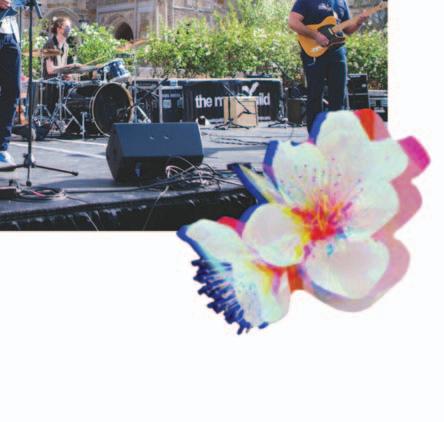
Indie-rock band Photo Negative kicked off the night. Lead singers and guitarists Matthew Hogan, CSOM ’22, and Benjamin Crandall, CSOM ’23, were joined by Nicholas Straub, MCAS ’23, on bass; Éamon Laughlin, MCAS ’22, on drums; and Stephen Ventura, CSOM ’22, on the saxophone.
The band mostly played songs off its EP, A Great Big Hole in the Wall , which is available on all streaming platforms. The band ended with its original song “Whatever Floats Your Boat”—a clear crowd favorite as audience members joined in, singing along from their seats.
Cherry Dawn Planet was next to take the stage.
The four-person band, composed of Lily Hafez, MCAS ’22; Stella Si, MCAS ’23; Calvin Czapko, MCAS ’24; and Madeline Dunlay, MCAS ’24, performed original songs that offered vivid critiques of contemporary society, such as “Corporate Cause” and “Institution.”
Hafez was on drums, Si was on
keyboard, Dunlay was on bass, and Czapko played guitar.
Cherry Dawn Planet was followed by Battery Man, a two-man band with a distinct jazz sound. The duo was a solely instrumental group, but its keyboardist was such a wizard on the keys that the lack of vocals did not detract from the performance.
Another two-man band, thefineprint., followed and was led by Caleb Savari, CSOM ’21, and Vladimir Vezikov, CEO and co-founder of Tulugy, an app that connects customers to home repair services.
Playing from its 2019 album, and Body Bags , the band showcased its robust sound. The band ended its performance with its song “One Song,” a heavy-handed guitar piece.
Following this performance, the band Uncommonwealth, composed mostly of BC freshmen, took to the stage.
Even though it is a relatively new band on the scene, Benjamin Austen, MCAS ’24; Thomas Lynn, CSOM ’24; Cole Dumas, MCAS ’24; Spencer Bono, MCAS ’23; Michael Vaquero, MCAS ’24; and AJ Morgan, MCAS ’24, played like they had been jamming together for years, and they already have a very enthusiastic fanbase that cheered them on Friday night.
Most notable was the group’s performance of its original song “Phoenix from Mars,” its newest single
the emcee of the night. Hogan is also the president of the Music Guild at Boston College, which hosts the Battle of the Bands competition in conjunction with the Campus Activities Board and the BC Arts Council.
The mission of the club, Hogan said, is to give musicians on campus a place to meet other musi-
COVID-19 pandemic this year.
cians and to give those musicians platforms to perform.
He said he met all of his bandmates through the guild.
He said he felt very fortunate to have had the opportunity to perform a live, in-person concert, despite the
one thi ng w to —w e ca n co me to th we c an s ti ll h ave th a communit y, ” Hogan sa
“When virtually everything else has been closed, I feel like music has been one thing we can all come to—we can come to these events and we can still have that same music community,” Hogan said.
After brief deliberat announce d th at P thefin ep rint., a n wealth wou ld to p er fo rm a fo llowing d Mu si c me nd ous pe op le t that ’s e di d o


After brief deliberation, the judges announced that Photo Negative, thefineprint., and Uncommonwealth would be moving on to perform at BC’s Best the following day.
Music has the tremendous power to bring people together, and that’s exactly what it did on the O’Neill Quad on Friday.
During the BC’s Best competition on Saturday, the three bands competed against the winners of the Singer Songwriter contest—Riley Aquilano, MCAS ’22, Adrianne Goodfriend MCAS ’23, and Samuel Frechette,
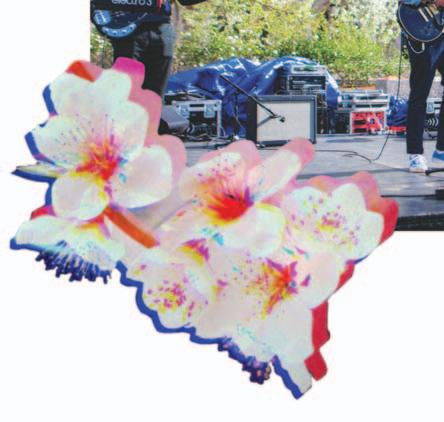
B Y K ATHERINE C ANNIFF Assoc. Arts Editor
student art. Another
Arts Walk was the Boston College
A5 THE HEIGHTS MONDAY, MAY 3, 2021
singer from Photo Nega-tive, was
Aquilano took home the top
d ays o f th e Bo se stiva l , stu d ents obby Robsham e at Lower wouldd ent art n ex h i b it o f BC twor k s, ocd wa ll s o f M a l one y O ’Nei ll y Hall ats t i n k is Arts d isp l a y e d in t he to ex h i b it i verse array l and ac ry lic scu l pture, an d ed on th e wa ll s. l d Stu d ent A ff airs o ff ice th e fl oor o f Ma l one y was f i ll e d with p hot o gr ap h s o f scenes f rom camp us th at were su b mitte d b y th e o ff ice’s socia l me d ia fll A rts Counci l’s g a ll er y in Carne y 203, teeme d wit h co l or f u l paintings an d scu l ptures. Nee d ing to a dh ere to COVID-19 socia l d istancing gui d e l ines, t h e A rts Counci l d eci d e d to sprea d th e A rts W al k th roug h mu l tip le b ui ld i ng s on campus. Yi fa n Wa ng , the A rts Fest visu al a rt s coordi
owe
om e Kite
ed
ed
nix fr om M ar s, it s ne we st s in gl e th at w as recent- ly release
d at B os to n Co ll eg e, w hi ch h os ts t he co nj unction Ac ti vit ie s Bo ard an d Co unci l. The
c lu b, Hogan said, is to gi ve musicians on camp us ot he r mu si
and to g ive those musicians platforms
per form. He s
hi s bandmates thro
gu
pe rform
en c lo se d,
f e has
nator a n d M C A S 22, sai d sh e sees th e event l lf
d d with o w as ut its n the n ot M O app h
s cas
e nd
“O ne iece. th e mn, 3; and A J e th ey ye ars, enthue m on
d on streaming platfo rms in M arch Ho ga n, t he l ea
mission of the
cians
to
ai d m et a ll o f
ug h th e
il d. felt
be
I
been
Qu ad D Be st on S th re pe te wi A M an n MC Sa mu MC AS ’ 22 Aq ui la no too k h pr ize.
who
do to become rich. focus on of ish but also how were character-
aspects
World Jacob over them Re the Germans’ intended to sho b W the alli enemies Nazis in t p oster atte m Jewis if were t to Germany Unf h anti p r e t h e po go ne. T of de pict h ave h w ithin the One sweatshir Camp Auschwitz” at t insurrection on Jan. 6, 2021. Another from Septe
GRAPHIC BY MEEGAN MINAHAN/HEIGHTS EDITOR
GRAPHIC BY MEEGAN MINAHAN / HEIGHTS EDITOR
GRAPHIC BY MEEGAN MINAHAN / HEIGHTS EDITOR
Seniors, from A1
On May 19, 2020, University President Rev. William P. Leahy, S.J., announced that students would be allowed to return to campus and classes would resume on Aug. 31.
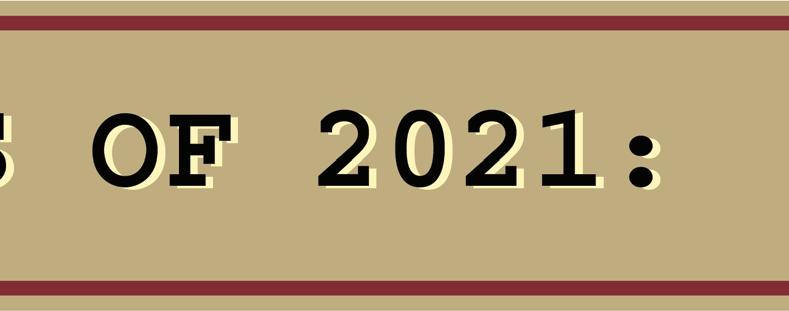
“I was like, ‘Awesome, but, like, at what cost? Like, what capacity?’” Kaitlin McCarthy, MCAS ’21, said. “I think like all summer, I was just kind of really nervous about going back and being here and what that would look like.”
After this news, a summer full of anticipation of updates from the BC administration about reopening plans ensued—in addition to the growing acceptance that senior year would not look the same.

“So I knew, okay, well … my senior y ear isn’t gonna look like my junior year,” Niebuhr said. “I had to deal with the ambiguity and wait and see. And I knew that it was difficult for a lot of my friends and colleagues as well because we wanted to see what our senior year was going to look like and have a lot of those memorable moments.”
“The emotions were just like so positive,” Hammers said. “It felt like, kind of, an environment that COVID couldn’t really change.”
McCarthy also had to lead shifts as a 4Boston leader. One of the most challenging parts, she said, has been fostering space for reflection without the same in-person abilities.
“It’s been so hard to even just like book rooms for clubs to meet in person and … to, like, still foster these in person interactions, … those sorts of things that BC really thrives on,” McCarthy said.
Musical groups have also struggled to adapt to COVID-19 protocols. The University Chorale of Boston College had to go completely remote, Niebuhr said.
“Singing is really tricky,” Niebuhr said. “You’re breathing on people. I’m really impressed and really happy with how things have gone with Chorale, but in the fall, … I was very concerned that, you know, having rehearsals over Zoom was going to be very unfulfilling.”
After three years of growing accustomed to their extracurriculars, many seniors spearheaded shifts to enable their clubs and groups to operate during the pandemic.
Stemming from BC’s Jesuit tradition, the University’s wide-ranging service groups are incredibly popular. Most rely on in-person trips or weekly service outings, which became difficult to continue due to COVID-19.
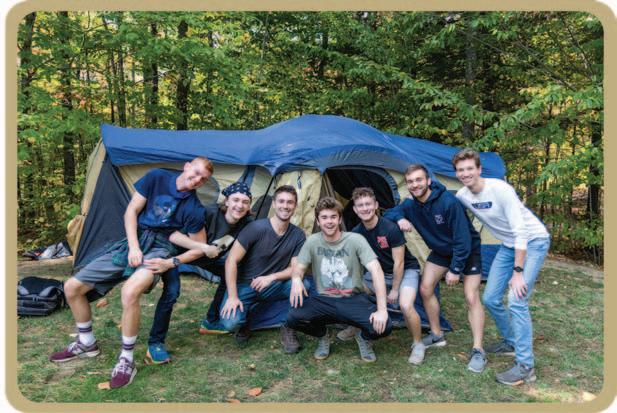
Through Appa Volunteers, students typically go on trips across the United
Niebuhr is also in the Boston College Symphony Orchestra, which faced a similar struggle of relying on in-person rehearsals and performances but not being able to accommodate wearing masks. Last summer was spent communicating with the University on how the orchestra could rehearse, eventually landing on a hybrid format where musicians could record in a physically distanced setup in Gasson Hall.
Despite missing the benefits of live performance, Niebuhr said that an upside to recording the music is being able to widely distribute it.
“I think the benefit that I didn’t
because the event was moved online. Although Constantino can’t reconcile the loss of the in-person performance, she has also seen the broader benefits of recording events, she said.
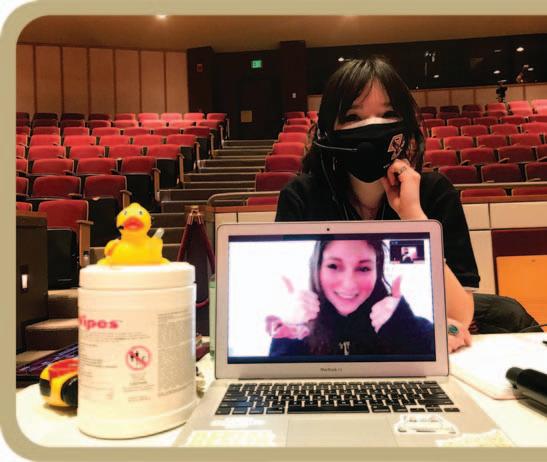
Theatre—another large performing arts presence on campus—has struggled to adapt to pandemic protocols. In-person performances have been limited, but in one show directed by Allison Lardner, Lynch ’21, cast members could only touch if wearing gloves.
“I think a lot of us are trying to kind of embrace what technology and what Zoom can do for what storytelling is, but of course, you know, there’s nothing like being on a stage and being with your castmates,” Lardner said. “I think the word of this year for me has been ‘compromised.’”
Other performing arts groups, such as Asinine Sketch and Improv Comedy, have also had to sacrifice normal live performances because of the pandemic. Brendan Barnard, MCAS ’21, and Hammers have both been involved in Asinine since their freshman year. Barnard, current Asinine co-president, said he has missed being able to perform live.
Certain groups, including BC’s peer support network Lean On Me, have experienced a surge in workload as a result of the pandemic, according to Lardner, chapter coordinator for the club. Lean On Me was already online-based, but its functionings, such as staff trainings, have now become entirely remote as well.
to talk about?’”
Another new initiative Viceconte led for WIB is a mentorship program between female seniors in the Carroll School of Management and female CSOM professors, which she said was inspired by the fact that hybrid


and has expanded fundraising and spread awareness on social media. As a result, charity: water raised $10,000 in the fall semester.
“Our goal since our freshman year has been to raise $10,000 … because $10,000 is enough to fund a water project, and that’s just something that hasn’t been done since I think maybe the first year charity: water became a club,” Rueve said.
After hitting their first goal within the first semester, charity: water decided to continue dreaming big, Rueve said, and upped their goal to $20,000—which they again hit.
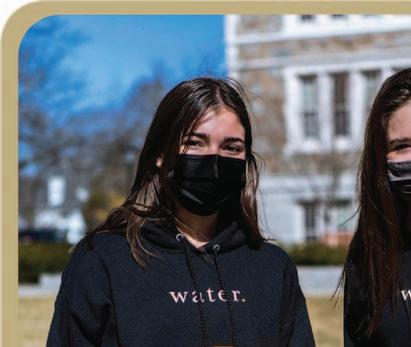
With many events canceled and people confined to their houses, quarantine provided a surplus of free time, of which some seniors took advantage.
After seeing high school Class of 2020 yard signs scattered across his neighborhood, Sepe came up with the idea to create Parsippany College Con-

States during Spring Break. When it became clear that this would not be possible, however, Appa leaders had to look critically at their mission, according to Kern, an Appa student leader.
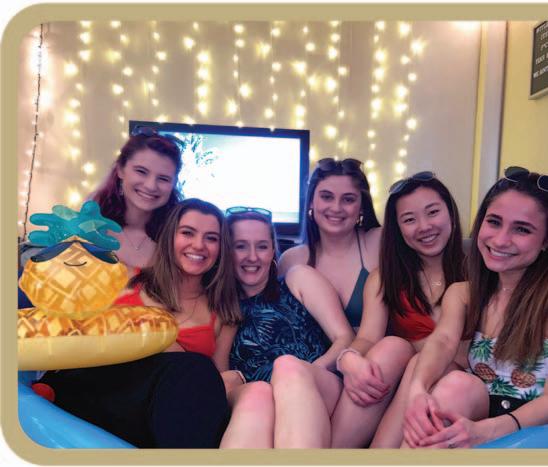
Instead of planning for their usual trip, Appa spent the fall semester engaging in seminars on topics ranging from race to housing insecurity to education, both nationwide and locally. Then, in the spring, groups were able to go on local service retreats, such as to the Centre Street Food Pantry in Newton, Mass., where Kern’s group went.
“In Appa, we always talk about Appa and beyond, meaning … we’re not just doing a week of service … we’re bringing the spirit of Appa,” Kern said. “It was really cool because … in Newton, it was like a mile and a half walk … this is something I can do regularly, and it kind of gave me the sense of, it gave me a bigger motivation to do what I can.”
Cole Hammers, CSOM ’21, said that his disappointment in not being able to attend his last Appa trip was minimized by his choice to apply to be a Kairos leader. Hammers hadn’t attended a Kairos retreat since his senior year of high school, he said, so attending one as a senior in college allowed him to go deeper into reflection.
see when we initially came up with this idea, but I’m now seeing, you know, coming up on Arts Fest, and we’re going to be showing this off to everybody is that now all of our work
“Lean On Me is a virtual system, you know, it doesn’t matter where you are on campus, or if you’re taking classes from home, from Arizona, from California, whatever, you can still text into the hotline, and you can still get support,” Lardner said. “Our basic functioning has not changed … it’s just intensified with everything that’s been going on COVID wise, race-relations wise, uncertainty wise, academics, relationships, etc.”
The pandemic posed many challenges to seniors’ extracurricular involvements that have been foundational to their four years at BC, but it also provided them with new opportunities for growth.
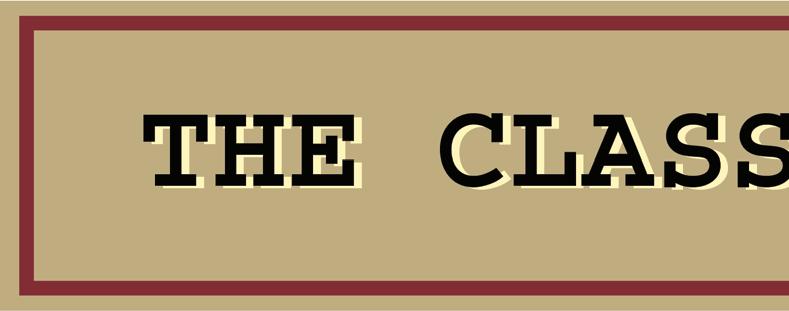
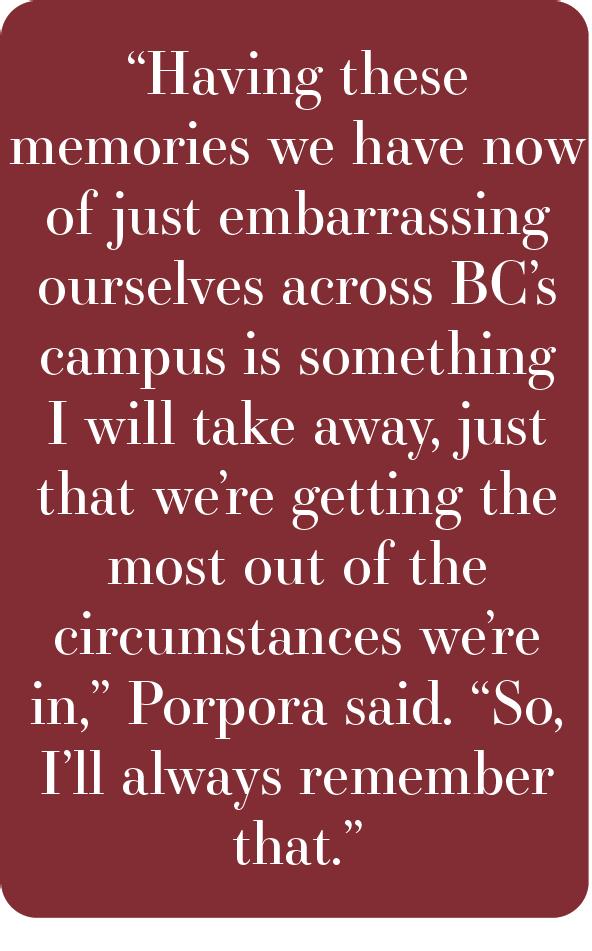
Mary Kate Viceconte, co-president of Women in Business (WIB) and CSOM ’21, said that she had to look at what events were the most successful in the past and determine how she could effectively transition these events online. One such event, the monthly WIB town hall meeting that brings in guest speakers, benefited from being virtual.
and remote learning has made student-to-faculty connections more difficult.
Working alongside WIB’s adviser and Director of Carroll School Undergraduate Assurance of Learning Dianne Feldman, Viceconte matched 14 professors with three to four seniors each, who met over the course of this semester.
“It’s like, ‘How can I leverage our network and our community … and create meaningful conversation that students are going to be able to take with them post-Boston College?’” Viceconte said.
Similarly, despite the challenges of having limited in-person events, charity: water has achieved record successes in terms of fundraising, partly because of the possibilities created by Zoom, according to Rueve, charity: water co-president.
This year’s Portico book for CSOM freshmen was Thirst: A Story of Redemption, Compassion, and a Mission to Bring Clean Water to the World which was co-written by charity: wa-

nect, an online service that connects high school students in Parsippany, N.J., with current college students.
Parsippany College Connect’s specific goal is to foster connections and build a community between current high school and college students in order to foster a smoother transition to college, Sepe said. The company has utilized social media to expand and has hosted Zoom meetings to open dialogues between high schoolers and college panelists, and it has been able to raise money to give two scholarships to high school students.
“That kind of hit home to me,” he said. “I was like, ‘Wow, this is a really tangible thing that I’ve done, that we’ve all done, you know, in the midst of this pandemic.’ And for me, that gave me a lot of pride, but also it felt rewarding.”
Other BC seniors took the opportunity to get involved with on-campus organizations when they returned to campus last semester. McCarthy began writing for The Gavel and got a job working at the Margot Connell Recreation Center.
is immortalized,” Niebuhr said.
For Olivia Constantino, MCAS ’21, the biggest loss was not being able to fulfill her role as student performer for Pops on the Heights in person

“The great thing about having this transition online is that we actually had more access to really cool speakers that we wouldn’t have had otherwise,” Viceconte said. “We interviewed a blogger, Freckled Foodie, we interviewed the TikToker Galey Alix, [and] we interviewed Bennett from The Bachelorette, which was our most attended event. That really helped to draw people in because I think when you … see a big name … you feel less, like, ‘Oh what am I going
Because Harrison’s talk brought increased awareness to charity: water, the organization has been able to continue normal fundraising activities
THE HEIGHTS A9
ter founder Scott Harrison and Lisa Sweetingham. Because the club could only host guest speakers remotely due to COVID-19, the club was able to invite Harrison to speak to CSOM freshmen via Zoom, Rueve said.
“I did join The Gavel, which has been really fun,” she said. “I had a little more extra time, and I started working in the gym. … I, like, enforce COVID protocol, [so] there are people who probably hate me. I tell them to keep their masks on, but I’m keeping this campus safe.”
Apart from finding new organizations and clubs, one group of seniors
A6 MONDAY, MAY 3, 2021
PHOTO COURTESY OF ALLISON LARDNER
Despite COVID-19 limitations, charity: water still fundraised on campus.
PHOTO COURTESY OF ELLIE RUEVE
Lardner took part in filming Arts Fest in Robsham Theater.
PHOTO COURTESY OF KAITLIN MCCARTHY McCarthy celebrated in the Mods in place of a normal Spring Break
PHOTO COURTESY OF BRENDAN BARNARD
Barnard and his friends go on hikes as a way to enjoy time off campus
has added a sense of fun to their senior year in a unique way—a dare jar.
Barnard, Hammers, and their fellow Mod residents found themselves bored one night before the spring semester started, so they wrote a bunch of dares on pieces of paper and put them in a jar, creating a game out of it. Each of the players had to film themselves doing the dares to prove they completed them.
When Joseph Porpora, MCAS ’21, returned to campus for the spring semester, he thought it would be a good idea to document the dare jar on TikTok.

What began as a simple solution to momentary boredom has turned into social media fame.
Porpora posts each week’s compilation of dares on his TikTok account, which has amassed over 130,000 followers and over 2.2 million likes at the time of publication.
Some dares include brushing your teeth for 30 seconds while on a Zoom class, doing a flash mob somewhere on campus, and setting up a lemonade stand on the Quad.
“I was doing a dare the other week where I had to set up a lemonade stand on the Quad, and a bunch of people came up and knew right away—they were asking me if it was for the TikTok,” Barnard said. “And then a bunch of, like, people in classes have mentioned that they’ve seen me on their For You page on TikTok, so it’s kind of funny to have a weird little bit of recognition.”
Barnard said that this weekly tradition has added creativity and laughter into their lives and that it will be the first thing that comes to his mind in the future when he looks back on his senior year.
For Porpora, having the dare jar and the TikTok account go viral has helped him and his friends make the most of their limited time left at BC, despite the abnormal circumstances, he said.
“Having these memories we have now of just embarrassing ourselves across BC’s campus is something I will take away, just that we’re getting the most out of the circumstances we’re in,” he said. “So, I’ll always remember that.”
accept that they would not get the same senior year that those who came before them did. Instead of feeling defeated, though, this year has been centered around attempting to still celebrate the special moments of senior year in modified fashion, according to Rueve.

“I think [that] our theme for the year is … it’s not going to be able to happen and don’t just like sit around and cry about it, but instead … either
Mods was at its peak during the warmer weekends of this year.
“The first four weeks were incredible,” he said. “Just, like, people [were] outside, you know, [I] cooked most of my meals on the grill. It was really nice. We got a volleyball net too, so we play that a ton. … I think the COVID stuff is a little easier to stomach when you can be outside.”
As a way to incorporate normal traditions into this unconventional year, Hammers said something he and his friends plan on doing is the drink-thedorms tradition, where seniors visit and drink with the current residents of their past dorm rooms and off-campus houses or apartments.
Despite the sense of loss surrounding BC traditions like tailgating on game days, seniors still found new and COVID-19-safe ways to embrace BC traditions.
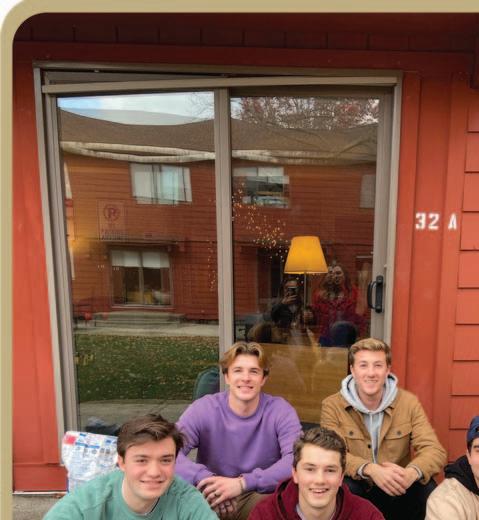
“We would go to … Tavern in the Square, and we do all the chants, and it just sounded really absurd, especially if there wasn’t as high of a BC crowd turnout in the restaurant,” Sepe said. “Even when you’re just sitting in a restaurant with like six people, it was really fun and we kind of kept that spirit.”
For Rueve, who has cousins that have played for BC and one who is a current freshman on the team, football has been an integral part of the BC experience, making its loss one of the most disappointing parts of the year.
“My roommates noticed that that was something I was sad about, and the first tailgate day they got a bunch of like chips and dips and like decorated our room, like ‘Happy game, Ellie’ so that was something that was really special and we just watched the game on our TV,” Rueve said.
The transition to being on a campus full of people but being restricted in terms of who you can see has been the most difficult aspect of this year, Niebuhr said. Staying in touch with friends outside of one’s close circles has been challenging, Sepe said.
“Even if we’re at a big tailgate, you know you’d always see someone that … you’re not, like, too close with them, but you always say hi to them,” Sepe said. “I felt that kind of the friends that were on the periphery … kind of like fell to the wayside.”
Above all, McCarthy said that she and her friends will continue to preserve traditions as much as possible through the end of the year, in order to feel the sense of celebration that is so integral to senior year.
this campus.”
Alongside cherishing the little moments, planning outings and other things to get excited about have also helped encourage Kern to try new things and remain hopeful, she said.
“We’ll plan things, like one day we went biking on the Bluebikes into the city or one day we went hiking,” Kern said. “I feel like how I’ve been remaining optimistic is to make little plans for myself to do something different, not just what I’m doing every single day.”
As the spring semester progresses, the increasing number of students getting vaccinated has also fostered a sense of hope among seniors for the return to “normal life.”
“I got my first shot of the vaccine … in early April,” Sepe said. “I was like, ‘Wow, it feels like, it’s like there is hope.’ … How does this happen [in] less than a year? Like, that’s insane. … I marvel at that. I’ll always remember that, and it’s one of those stories you’ll probably tell your grandkids.”
Other seniors recognize the efforts of student organizations, such as the Undergraduate Government of Boston College, which has been working to host more in-person events in the spring semester.


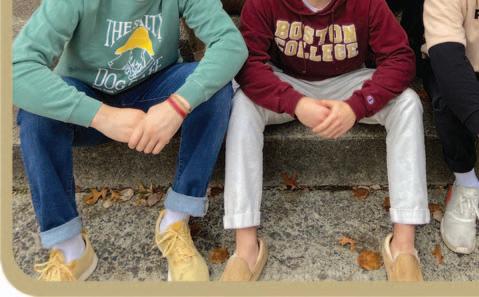
“I went [to] Equinox, and that was the most normal-feeling event I’ve been to in a year and a half,” Jessica Thalheimer, CSOM ’21, said. “I also like the BC After Dark. That’s pretty cool how they’re serving food and alcohol on campus now, so I feel like BC is really making an effort for the students to have fun.”
Giancarlo Isotti, CSOM ’21, director of the Mentorship Programming Team (MPT) for the Campus Activities Board (CAB), said that COVID-19 adds a layer to the already difficult task of event planning.
Not only has CAB had to think about the normal aspects of event planning—such as making the events accessible to everyone, marketing the events, and planning other logistics—but it has also needed to monitor students keeping their masks on, sanitizing their hands, and limiting close contact with their peers at events.
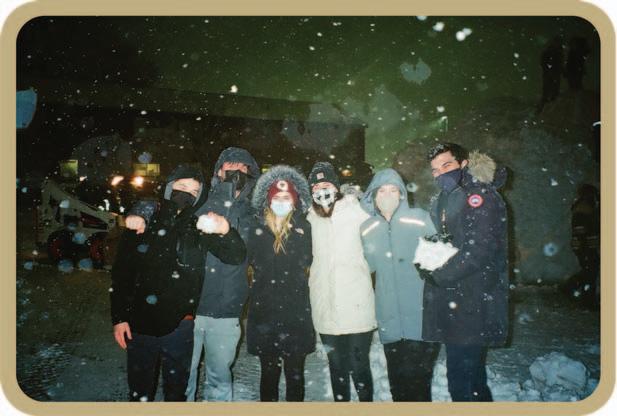
Though CAB has undergone many changes, Isotti said that the club has been one of the highlights of and added a sense of normalcy to his senior year.
“I think almost everything about college has changed, and classes are different, and hanging out with friends is a lot different, going out is much different, but the Campus Activities Board spirit has still remained the same,” he said.
solidarity and comfort within their communities.
With COVID-19 vaccines now open to all adults in the United States, a sense of normalcy seems to be returning. Although the Class o f 2021 will not be able to experience a “normal” BC as students again, many seniors said they have hope that next year, underclassmen—especially current freshmen—will enjoy the typical BC traditions.
“I have hope for, you know, years of BC ahead and I hope that I will come back as an alumni for football games and you know, like, finally attend my tailgate,” McCarthy said. “And, you know, all of those things that, like, do make BC so special, they will come back.”
With a newfound appreciation for pre-pandemic activities, others have grown in their ability to not take things for granted.
“You never know when something can be taken away from you,” Rueve said. “I think that’s something that the pandemic really, really made me realize, and [to] be thankful for every lacrosse game that I get to manage and every charity: water meeting, and every opportunity to see family or call a friend.”
The COVID-19 restrictions have pushed seniors to think of new ways to enjoy their limited time left at BC, breaking from the routines they have grown accustomed to over the course of their previous three years.


“I think a big thing I’ve learned during COVID at BC is the importance of breaking routine,” Barnard said. “I found that by kind of breaking routine and getting off campus and doing, you know, just different activities with my friends and roommates that we’ve been able to kind of make the most of our time here and slow down the limited time we have left.”
While seniors grieved their senior year being different from what they had anticipated, they have also been at the forefront of helping the entire campus adjust.
“[We’ve] handled it with grace in the sense that as much as this was a pretty bad way to go out, you know, we’ve kind of kept going,” Sepe said. “We’ve sustained this campus. … There’s really great student leaders in the senior class that have really helped underclassmen, you know, adjust and, and to get through this as a community.”
Focusing on what is truly important, by prioritizing the things and people that matter, became the defining factor of the Class of 2021’s final year.
try and mimic it or just like have a positive attitude because that’s all you can do,” Rueve said.
Game days in the Mods were some of the most apparent examples of the unusualness of the past two semesters.
With tailgates prohibited and BC football playing without spectators, the Mods were eerily quiet on game days. Even so, seniors took advantage of the coveted outdoor space of the Mods.
Mod residents Barnard, Hammers, and Porpora said they believe that one of the best parts about living in the Mods—especially during the pandemic— has been having a yard.
“The reason people want to have [a Mod] is … you get to throw crazy parties, and that’s obviously not a part of this year, but I think having a backyard, … having just like fresh light and air, and having the ability to just go outside is, now more than ever, just a great thing to have,” Porpora said.
Hammers said this benefit of the
“I don’t really know what Senior Week’s gonna look like, but … we’re all planning on, even just hosting a Commencement Ball among ourselves and, like, wearing old prom dresses and trying to, you know … go into Boston in ball gowns just for fun, and just do our thing, trying to make the most,” McCarthy said.

At the expense of having to limit social circles, seniors have gotten to spend increased time with their roommates, whether sitting next to each other during Zoom classes or cooking lunch together, Kern said.
McCarthy also said that the moments spent with her roommates and friends helped establish a sense of community and togetherness.
“I think I’ll always look back on this year as being, like, weird but still good,” McCarthy said. “It’s still senior year, you know. … [It’s] the times, like, grilling in the Mods with my roommates or Res walks with friends and [going] to White Mountain like three days a week. … It’s the little things and just being around here on
In running MPT—CAB’s freshmen introduction program—this year, Isotti said he enjoyed meeting the freshmen and building a new BC community alongside them, he said.
“[I’m] a senior in the Campus Activities Board, I’ve been doing this for four years now,” he said. “And to kind of walk with the freshmen through this experience of, like, creating a new Boston College experience, I think it’s almost like a full reset in a way.”
“[It’s] the two-minute conversation I had with my roommate when I came home or, you know, just cooking next to my roommate or going on a walk with someone. If those are my favorite parts of the day, then why am I not having some of those every day?” Kern said. “I should carve out a little bit of time every day, that is maybe not academically or professionally productive, but socially, emotionally, personally, productive for me. And so I think that’s something I’ll carry with me in the future years.”
Despite the disappointments this year has wrought, seniors have found
THE HEIGHTS A9
Unchanging circumstances left seniors with no choice other than to
A7 MONDAY, MAY 3, 2021
Megan Gentile and Gabriel Wallen contributed to reporting.
Seniors in the Mods have adapted to COVID-19 in various ways.
GRAPHICS BY OLIVIA CHARBONNEAU / HEIGHTS EDITOR
PHOTO COURTESY OF GIANCARLO ISOTTI
PHOTO COURTESY OF GIANCARLO ISOTTI
No matter the weather, Mod seniors take advantage of the outdoor space.
To Promote Dialogue, Student Organizations Should Not Invite Prejudiced Speakers
Student organizations should not invite discriminatory speakers that ostracize members of the BC community and do not constructively participate in open debate.
There is a consistent pattern of hateful and inappropriate speakers being invited to speak on Boston College’s campus. In March, BC Republicans hosted political scientist Hadley Arkes, who promoted conversion therapy and argued that homosexuality went against natural law. In April, the Latin America Business Club invited Álvaro Uribe, the former president of Colombia who is currently under investigation by the United Nations for human rights violations and witness tampering. In November of 2019, BC Republicans sponsored Andrew Klavan, who has promoted Islamophobia and claimed that European culture is superior to all other cultures. These speakers actively discriminated against people in their remarks, which is harmful to the affected populations and created a hostile, divisive environment on campus.
There is an important distinction between controversial speakers who open up honest dialogue and hateful speakers who shut down debate under the guise of free speech, creating outrage and controversy that only serve to further divide people. Student clubs should host speakers who promote respectful, productive academic debate. Inviting prejudiced, divisive speakers polarizes students and is counterproductive to academic debate.
In its policy on discriminatory harassment, BC notes that “Nothing in this policy should be construed to infringe on the academic freedom of members of the University community and their
Week in Photos
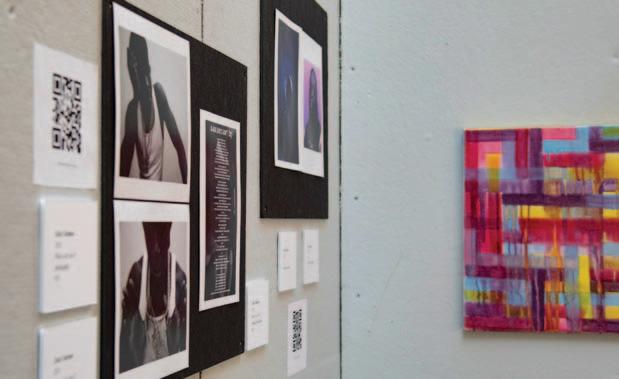
right to use the academic forum provided by the University either to discuss controversial subjects or to express ideas with which some or most members of the University community strongly disagree.”
In the interest of free speech, student clubs should be able to host controversial speakers, but students also bear the responsibility of maintaining ongoing and respectful discussions on campus. The opposite is accomplished when student groups invite speakers who create a hostile environment with their discriminatory speech.
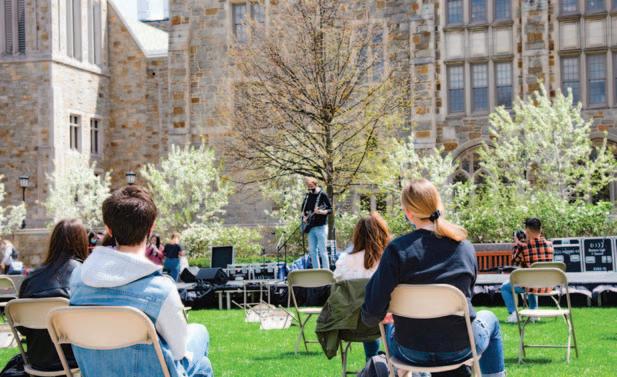
For example, in September 2013, the St. Thomas More Society hosted Ryan Anderson, who spoke at the event titled “A Case Against Gay Marriage.” Many students who disagreed with Anderson attended the event in protest, but they participated in a respectful question and answer session with Anderson.
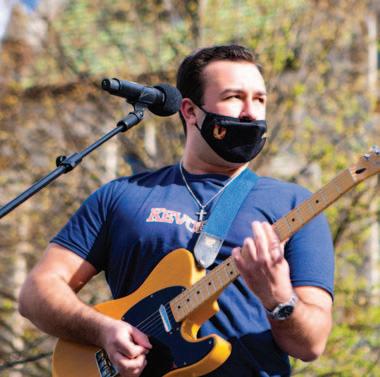
In March 2019, the BC Pro-Life Club hosted Kristan Hawkins, who is the current president of Students for Life of America and titled her presentation challenging the right to abortion “Lies Feminists Tell,” which incited intense debates on campus. Similar to the 2013 event, students whose views opposed Hawkins’ attended the event and participated in a civil question and answer session.
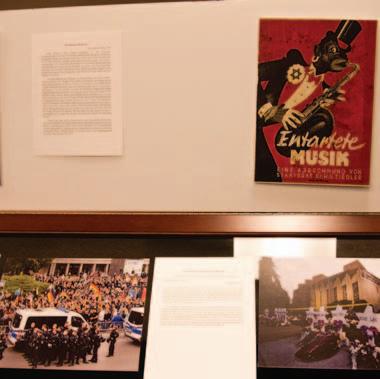
Holding controversial events on campus is not exclusive to the political right. Another controversial political event on campus that sparked meaningful debate is BC Students for Justice in Palestine (SJP)’s Peace, Not Apartheid Week that it has held in the past. In 2016, the week-long event featured 8-foottall walls reading “Free Palestine” and “Peace, Not Apartheid.” The group also invited Nathalie Handal,
a professor at Columbia University who spoke about her Palestinian roots. The Israel-Palestine conflict is a controversial topic, but SJP’s event successfully created open dialogue.
Speakers do not have to share the views of the Heights Editorial Board, students, faculty, or the University in order to be invited to campus. Freedom of speech is protected under the First Amendment, and student demonstrations, including free speech, are allowed on campus as long as they “do not violate directly or indirectly the rights of others,” according to the Student Code of Conduct. Clubs should not invite a guest speaker that can be accused of breaching the peace on campus, and therefore doing more harm than good. Klavan, for example, was met with disruptive protesters who he egged on.

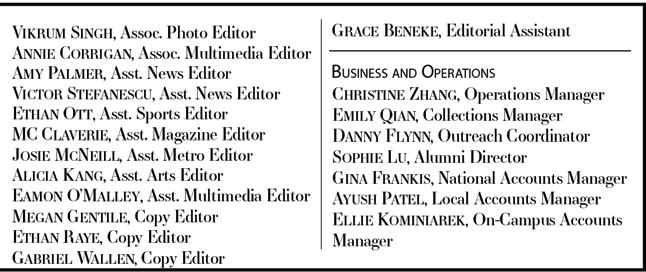

The BC Police Department was needed to provide security reinforcement because they were aware of the protests that would occur during Klavan’s event. Purposefully inviting a speaker that is going to incite unsafe conditions on campus is irresponsible.
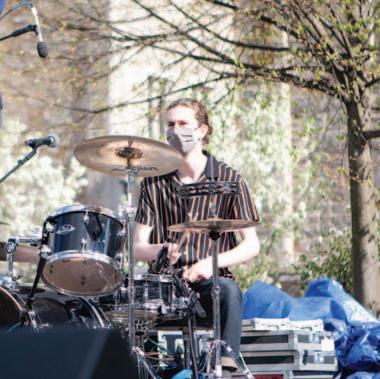
There must be careful consideration about facilitating conversations without denying BC students their rights. These rights include both the right to be respected as a human being and the right to feel safe at all times on campus.
BC has witnessed a pattern of bias-motivated actions and microaggressions that do not create a sense of belonging and community that every student equally deserves to be a part of. Discriminatory speakers that transgress the bounds of controversy to promote hateful beliefs and actions fuel this phenomenon.

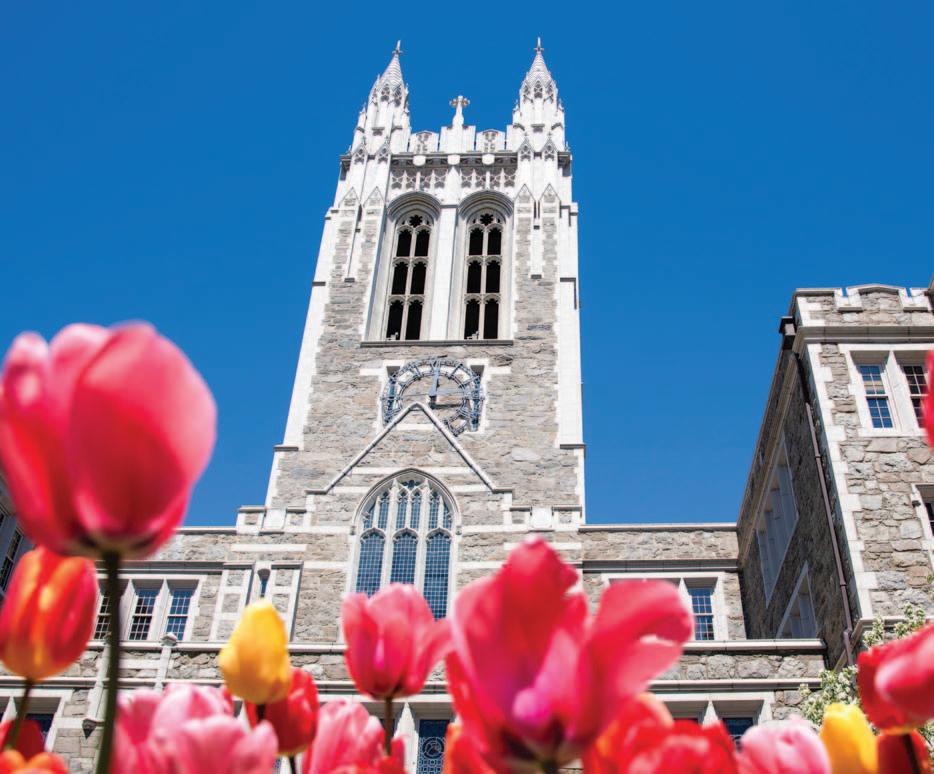
THE HEIGHTS A8 MONDAY, MAY 3, 2021 EDITORIAL
Top photos, left to right: Matty Hogan, CSOM ’22, lead singer for Photo Negative performs at Battle of the Bands at Arts Fest, Friday, April 30; Photo Negative’s drummer Éamon Laughlin, Heights Editor and MCAS ’22, performs at Battle of the Bands at Arts Fest, Friday, April 30; Pieces from the poster exhibit on the evolution of anti-Semitic iconography are on display in the O’Neill Library reading room, Thurday, April 29; BC infielder Luke Gold runs to base, Friday, April 30.
Bottom photos, left to right: BC students attend the Singer Songwriter Competition at Arts Fest, Friday, April 30; Student art was put on display in the Carney Art Gallery, Friday, April 30; Tulips bloom outside of Gasson Hall, Monday, April 26.
(IKRAM ALI / HEIGHTS EDITOR); (NICOLE VAGRA / HEIGHTS STAFF); (ADITYA RAO / HEIGHTS STAFF).
Minority Groups Should Support One Another
cry like I’d never seen before, and I was devastated to see so much agony.
Speaking from my experience being a Latina, I can tell you that being a minority is not easy. While I think most people today are much more aware than in the past of the struggles that minorities face, many are still not aware of the competition that minority groups tend to have with each other.
This was brought to my attention recently when I attended a casual but very open and honest Zoom call with the dance group Fuego del Corazon, of which I am a member, and the Philippine Society of Boston College to talk about anti-Asian hate crimes.

The first part of the meeting was very informational. To be honest, I had not realized how unaware I was of the prevalence of these hate crimes that have been happening, but then once the statistical talk was over, we all sat and listened as some attendees poured their hearts out in grief. It was beautiful, but it was also heartbreaking. I saw friends of mine that belong to the Asian community
All I could think about sitting there, besides what actions I could take or how I could be of more help, was, “I am a Latina, but I am scared to talk and resonate because I have not been through this. It is not my place.” What I failed to realize for all this time is that it was my place, in a way. It came up in the Zoom call that minorities tend to diminish the struggles of other minorities by bickering about who has gone through more. People on the call were of several different minority groups, all of which have experienced oppression. While the experience of some has been worse than others, oppression is oppression. The truth is none of us deserve it.
We should be focusing on the fact that we, as minorities, have all experienced some sort of oppression, and it is not fair to be comparing our experiences. I had never really grasped this concept until I was on the Zoom call with so many people belonging to different minority groups and saw how we all came to stand by each other in solidarity.
Before this call, I had silenced myself. I was afraid of admitting that I felt I was being discriminated against because I did not want to offend anyone. Time and time again I have opened myself to other people about microaggressions I have faced in the past as a Latina, and I get the response of


“Oh, but you are white-passing, you don’t have it as bad as others.” I knew that other people had it worse than myself, but the time of silencing myself is over. Yes, I am white-passing, but that does not mean I don’t have a right to be upset if I am offended by things that others say about my heritage and roots. I have a voice, and I have just as much of a right to use it. Everyone does. It is time for us all to realize it. Because if we do not, we will never be able to stand our ground against any mode of discrimination.
Being tagged as a “model minority” does not mean you don’t struggle. Being tagged as a “white-passing Latina” does not mean you don’t struggle. We all struggle, no matter what minority group we belong to, and it is not right to compare and diminish the pain of others.
As minorities, we should be standing together, with each other, to hear and validate one another. As minorities, we should not shun or deem one group unworthy of reparations or conversations depending on our struggles. The point is that we all struggle, so we should grow from those experiences together.
Isabella Nassar is an op-ed columnist for The Heights. She can be reached at isabella.nassar@bc.edu.
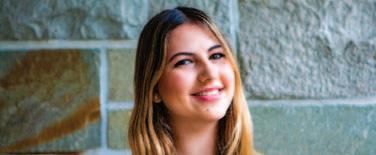
Young children often have a special stuffed animal or blanket that they take with them everywhere they go. College students also have a comfort item: a reusable water bottle. Whether it’s a Hydro Flask, S’well, YETI, or a coveted UGBC collectable, reusable water bottles are always there, no matter how tough the going gets.
The Sun Sets on Freshman Year
often catch myself daydreaming about my pillow as my eyes attempt to focus on my computer screen.
CAMERON WALKER
Walking from Upper Campus to the gym at 6 a.m. changes a person. One morning a few weeks ago, while walking to the gym, I witnessed possibly the most gorgeous sunrise I’ve ever seen. The sun glowed across the horizon, coloring the clouds shades of purple, orange, and pink that I’ve never seen before. Compared to the usual pale blue of the sky, the sunrise was the most picturesque backdrop for Gasson imaginable. Alone with my thoughts in the quiet of the morning and admiring the beauty of a silent campus, I realized something: There was only a month left of classes.
One month. Wow, where has the time gone? When I arrived on campus in September, I couldn’t even fathom reaching this point in the year. Part of me was just convinced that COVID-19 would thwart my plans for spending the entire year on campus. But thankfully, we’ve made it, and I am happy to report that the freshman experience is no longer “fresh.” The exciting newness of college has long worn off and I’ve been left to hobble my way through the rest of the year just like everyone else. Without a doubt, I’ve adjusted well to my new role as a college student, but at a cost.
Right now, all I can think about is how tired I am. Before college, I thought I knew what it meant to be tired, but, boy, was I wrong. When I say that I could sleep for eight days straight and still feel exhausted, I promise I’m not exaggerating. While existing somewhere between the third and fifth floors of O’Neill, I
If that isn’t bad enough, I’ve become the CEO of the library nap. With my head resting on my bicep and my face parallel to the table, I award myself 15 minutes of peaceful sleep smack dab in the middle of the stacks probably three times a week. At night, as I walk across campus, sometimes I’ll pick up the pace so I can get into bed just a little faster and gain a few extra minutes of sleep. In my state of absolute exhaustion, I’ve made almost a game out of finessing sleep from wherever I can find it.
On top of being exhausted, I’m academically overwhelmed. When I was in high school, alumni returning to visit campus would always warn seniors that the first semester of college was easy, but the second semester is when shit hits the fan. In my personal experience, truer words have never been spoken. Not to brag, but I coasted through the first semester of college. My classes were comparable to the ones I took in high school and I found the workload manageable. But this semester could not be more different. Instead of managing my work, I feel like I’m perpetually behind on all my assignments. No matter how thoroughly I organize my agenda, part of me remains convinced that in some deep, dark corner of Canvas exist thousands of assignments I’ve neglected to do or forgotten to submit. To combat this inner fear, I’ve started taking pictures of the “Submitted!” message Canvas flashes after you turn in your work. This way, when I wake up in the middle of the night unsure that I’ve submitted a paper worth 40 percent of my grade, I have my picture to assure me that not only did I submit it, but also that I am crazy.
Also, who was going to tell me that freshman year is so emotionally draining? I would consider

myself an extroverted person, but at this point in the semester all I want is to sit in the silence of my bedroom at home and stare at a blank wall for about a week. Trying to coordinate who to eat meals with, study with, and go out with on the weekends is basically a full-time job on top of a full academic course load. Then, slap on a minimum of five visits to the gym each week and just like that you’re aggressively overscheduled. Overall, just existing at BC requires a level of stamina that I clearly have not yet mastered.
But, there is hope! A light at the end of the stress-induced tunnel: summer vacation. Don’t get me wrong, that sounds incredibly appealing, but I’m not exactly sure I want to leave just yet. Although college is stressful, I still love it here—something I easily forget the minute things get hard. So, in the remaining days of the semester, I think it would be best if we all focus on the things we love about college instead of the stress and exhaustion. Without a doubt, the final weeks will be the most challenging of the year, but part of me still thinks that there is good to be found within it. Not that you should take advice from a person who takes screenshots of Canvas, but recently, I’ve found that focusing on all the things that make BC special has been the only thing that gets me through the week. Reflecting on and showing gratitude for the good is a much better use of time than counting down the days until school ends. Because in the limited amount of time left in the year, I’ve come to appreciate days spent with friends in the Rat, afternoon runs around the Reservoir, study sessions with classmates in Bapst, and of course, the way the sunrise looks next to Gasson.
Cameron Walker is an op-ed columnist for The Heights. She can be reached at cameron.walker@bc.edu.
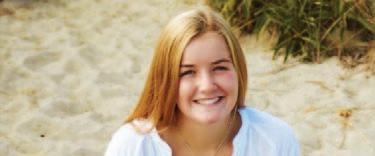
Op-Ed: Faculty Advancing Racial Equity

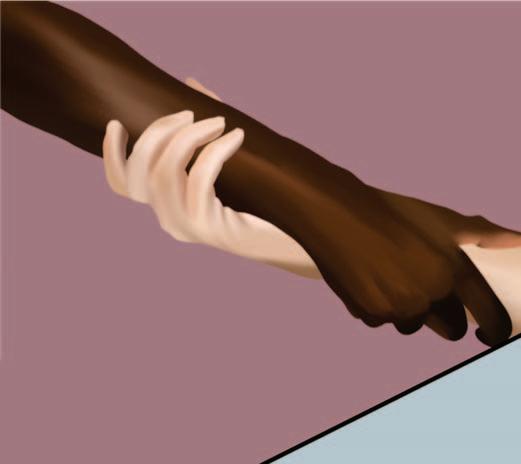
Following the recent wave of racist incidents on Boston College’s campus and an insufficient administrative response, some BC students have raised a question: “Where are the faculty?” Many BC faculty work individually and in existing groups to challenge racism on campus. A newly formed Faculty for Justice project called Faculty Advancing Racial Equity (FARE) commits to collaborating with student, faculty, and staff partners to establish clear and concrete actions aimed to disrupt and end patterns of racist behavior, identify and overturn white supremacist systems, and build new institutional and community structures that reflect true racial equity.
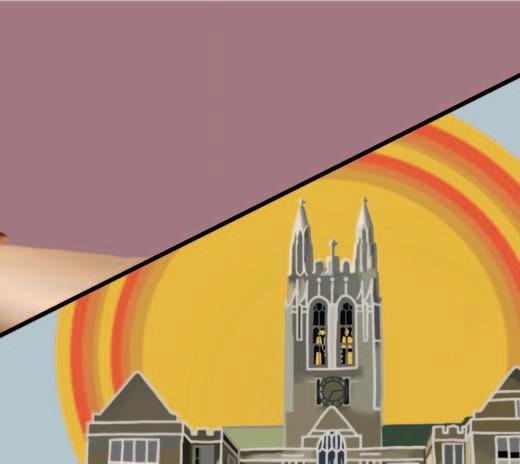
The 168 undersigned BC faculty endorse FARE with the following mission:


•To acknowledge that a history of white supremacy has shaped many cultural norms and institutional policies and practices, and to commit personally to active, ongoing, and anti-racist work to subvert them.
•To formalize our own and University-wide support for students, faculty, and staff of color.
•To craft justice-oriented, decolonized syllabi that offer equitable course policies.
•To push “upward” within the University so as to persuade decision-makers to radically revise institutional policies and practices toward racial equity.
•To center the perspectives of colleagues
identifying as members of underrepresented communities, and to intervene if and when those perspectives are deprioritized.
Faculty and staff are invited to join us, and students are encouraged to communicate ideas and priorities. Please email fare4bc@ gmail.com to acknowledge your commitment to active participation and to view our full mission statement, as well as a working list of critical anti-racism resources for faculty and administrators. We thank our students for their input over the last year, and we commit to working over the summer to develop concrete plans so that we may all return to a more equitable environment in the fall.
Read the full list of signatures at bcheights.com
The opinions and commentaries of the op-ed columnists appearing on this page represent the views of the authors of those particular pieces, and not necessarily the views of The Heights
In the era of technology and “screenagers,” the cost of capturing the moment is no longer being a part of that moment. It’s easy to get caught up in how everyone looks in a photo or if the lighting is perfect for public Snapchat stories. Disposables are a great way to hold onto the little moments, and opening up developed photos is like Christmas morning.
The feudal rivalry between Newton and Upper freshmen is a long-standing Boston College legacy. Newtonites bear the burden of the bus, and Upper students endure the stairs and Mac dining. Upper students, however, tend to see themselves as superior simply for lucking out in the housing lottery. There are pros and cons to living on both campuses, and this superiority complex must go.
BC students have the unique experience of suffering through semester-long midterms. Exams that constitute “midterms” can be scheduled for as late as the week prior to finals week, which is extremely frustrating. As students attempt to prep for the final push of exams, additional papers, projects, and midterms are also weighing down on them.
THE HEIGHTS
MONDAY, MAY 3, 2021 A9
ISABELLA NASSAR
Comfort Water Bottle
Disposable Cameras
Upper Privilege
Exams Before Finals
GRAPHIC BY MEEGAN MINAHAN AND OLIVIA CHARBONNEAU / HEIGHTS EDITORS
‘A Sun’ Presents Stellar Portrayal of Familial Grief




 B Y G RACE M C P HEE Heights Staff
B Y G RACE M C P HEE Heights Staff
Sometimes, films come along and electrify both audiences and critics on a massive scale. But, there are also awe-inspiring films equal in caliber to these blockbusters that manage to fly under the global radar. The 2019 Taiwanese powerhouse A Sun , released
on Netflix in January 2020, is one of those films.
Following the story of two brothers, A Sun is a deeply introspective, darkly comedic, and heart-wrenching examination of a family dynamic gone awry following the incarceration of teenager Chen Jian “A-Ho” Ho (Chien-Ho Wu). After a shocking opening scene, A-Ho’s mother and
father, Miss Qin (Samantha Shu-Chin Ko) and A-Wen (Yi-wen Chen), as well as his older brother, A-Hao (Greg Han Hsu), are thrown into complete emotional chaos while trying to pick up the pieces of what A-Ho left behind.
Each family member takes a different approach to coping. A-Wen turns inward, refusing to acknowledge A-Ho as his son and diving headfirst into supporting his older son, A-Hao, in his academic pursuits. Qin, after learning A-Ho had gotten a 15-year-old girl, Xiao-Yu (Apple Wu), pregnant prior to his imprisonment, continues to visit A-Ho in prison and takes Xiao-Yu under her wing at the hair salon she works at.
A-Hao, burdened by the weight of his father’s heightened expectations following A-Ho’s failures, silently suffers. While the plotline follows the aftermath of the arrest, the one thing the family does not do is openly acknowledge the extent to which they are all affected by A-Ho’s actions, both

individually and collectively. They walk together in silence–unable to acknowledge the pain they feel watching A-Ho’s life fall apart.
A Sun, in short, is an absolute firecracker of a film. With engrossing and poetic dialogue, it catches audiences off guard with moments of comedic relief in its otherwise emotionally heavy script. The acting of each character is so spot on that it doesn’t even feel like watching a movie.
Rather, it just feels like watching four people unravel around each other in real time. In addition to the excellent writing and acting, the cinematography is stunning.
Multiple close-up shots of the actors lay bare their emotional distress as they navigate their complex relationships. Filmed in Taipei, Taiwan, the city’s architecture and scenery shine in beautiful landscape shots. But, the contrast between the scenic city and the family tragedy encapsulates the generally bleak tone of
the film.
There is one breakout star of A Sun : Greg Han Hsu’s portrayal o f A-Hao. Hsu’s A-Hao is perhaps the best character in the entire film—both likable and heartbreaking at the same time. From his wide, sad eyes to his broad, hunched shoulders, A-Hao is the picture of a young man struggling to keep himself afloat in the wake o f a tragedy.
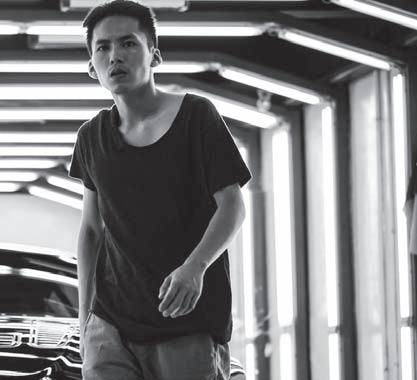
Despite his universal kindness and his bright future, audiences cannot help but feel absolutely crushed for A-Hao as he begins to break under pressure. Hsu plays A-Hao with incredible precision and impeccable sadness.
Ultimately, A Sun is a complete triumph. It’s shocking that it wasn’t, at the very least, nominated for Best International Feature Film at the 92nd Academy Awards alongside Bon g Joon-ho’s Parasite. A Sun , in its epic sadness and dark reality, is a classic drama.
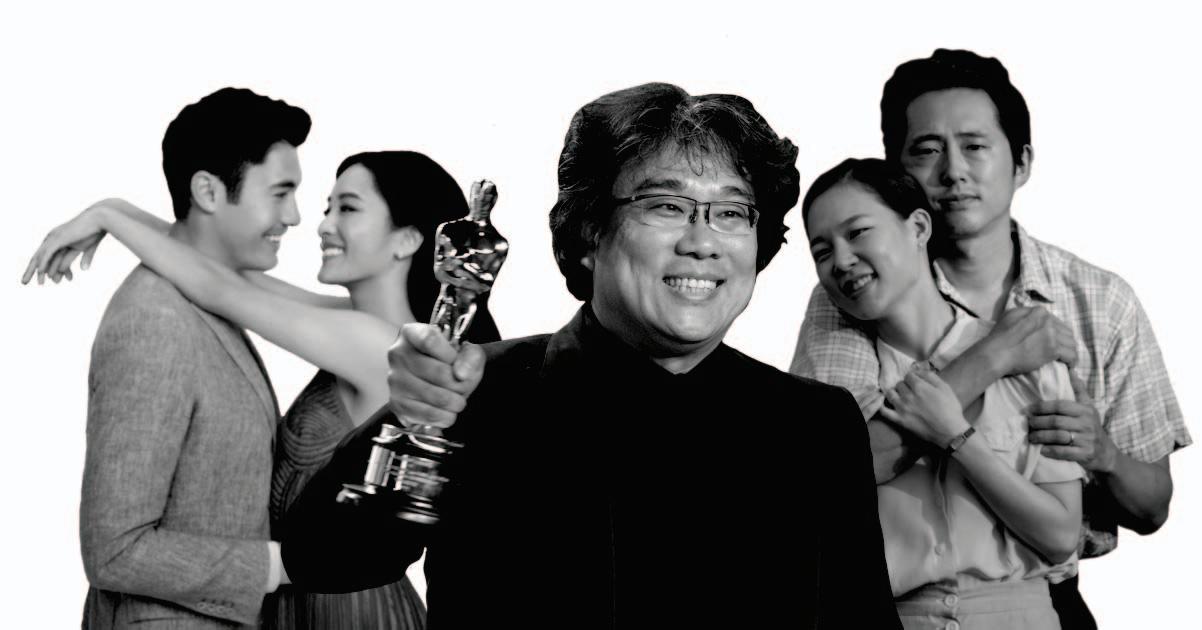 PHOTO COURTESY OF NETFLIX
PHOTO COURTESY OF NETFLIX
Korean Film Depicts Downfall of Corrupt Politician
BY SHAUN TAXALI Heights Staff
After the success of Parasite and the criminally underrated Burning in 2019 and 2018 respectively, American audiences eager to watch more enticing films from South Korea can turn to the 2020 film The Man Standing Next, a political thriller directed by Woo Min-ho based on the 1979 assassination of Korean President Park Chung-hee.
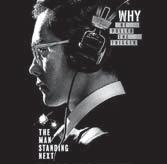
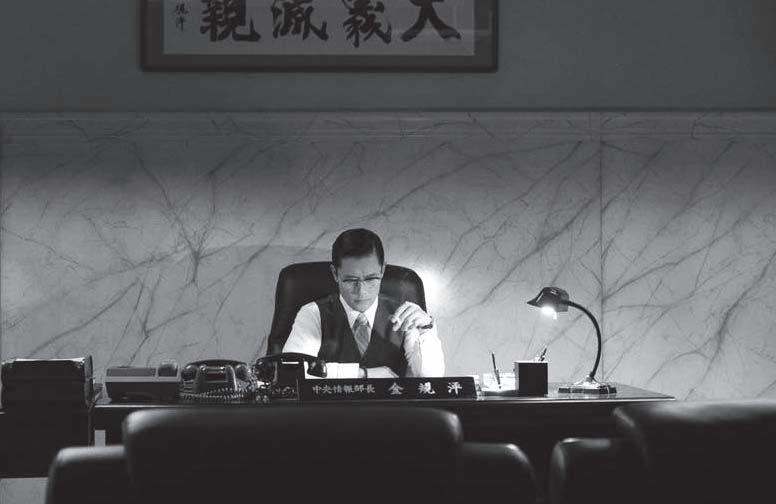
Winner of Best Film by the Korean Association of Film Critics in 2020, the movie breaks down the 40 days leading up to Park’s assassination. It showcases the political jockeying behind Park’s closest associates and serves as both an entertaining historical depiction and an insight into the political turmoil that Korea experienced for decades after the Korean War. For American audiences that may be unfamiliar with the ruthless and authoritarian rule of Park or the Bu-Ma Democratic Protests, the film can explain a lot about the political cli-
mate in Korea at the time. Although the film is a historical retelling, its central message still rings true today: Political figures must be held accountable for the consequences of their actions.
The film takes a few historical liberties, such as combining several political officials involved in the assassination into one characater, Kim Gyu-Pyeong (Lee Byung-Hun). Kim serves as the “man standing next,” the director of the Korean Central Intelligence Agency (KCIA) and the clear successor to the chilling and calculated Park (Sung-min Lee).
Conflict ensues when Park Yong-gak (Do-wan Kwak), a former KCIA director and friend of Kim, testifies to the United States Senate in an effort to publish a manuscript and expose corruption and abuse within the Park regime.

But as the relationship between Kim and Park deteriorates, Park begins to favor the persistent, status-seeking lackey Kwak Sang-Cheon (Hee-joon Lee)—an equally corrupt man who eventually suggests to Park that he dispatch tanks

to kill millions of protesters in Busan during the Bu-Ma Democratic Protests.
Lee plays Park perfectly, hitting every tone of a demonic and power-hungry ruler. The audience is first introduced to Park while he is getting a hot shave at a barber as he stares ghastly into the mirror, which gives audiences a necessary first impression of the character. Throughout the movie, Lee leans into this persona.
There are no glaring issues with the movie, and the film becomes incredibly engrossing in the final 15 minutes when the assassination takes place. But, there is a lack of emotional buildup to that crescendo. The tension between Kim and Park could have been much more intense, as the friends became enemies in the midst of a brewing political storm. If director and screenwriter Woo put more emphasis on the dynamic and relationship between Kim and Park, he could have made this an edge-of-yourseat thriller.
Released over 40 years after Park’s
assasination, the themes of political accountability and transparency in The Man Standing Next are still prevalent for audiences today.
Whether it is former South Korean President Park Geun-hye, who was impeached and imprisoned in 2017, or the only twice-impeached president in U.S. history Donald Trump, the need to stand
MOVIE
up against rulers who abuse their power has always been relevant.
The Man Standing Next serves as a reminder that when political power teeters into corruption, action must be taken to prevent further injustices. Though the film showcases a rather violent solution, it also displays just what is at stake when citizens’ individual rights are violated.
Kang: Exploring Asian Representation in Hollywoo d
BY ALICIA KANG A sst. Arts Editor
It’s about time for movies and TV to include some sort of representation, and recently, more and more films have increased the diversity of their casts and storylines. When I asked Becky Mode, a television producer most known for the Netflix limited series Unbelievable, what caused Hollywood to attempt some semblance of diversity in the past few years, she said that the industry was motivated by a sense of shame.
Through the Women in Hollywood course, taught by Christina Klein and Kelsey Norwood, I was able to be a part of a discussion with Mode, in which she said the entertainment industry knew for years that it was leaving behind massive portions of its audience. On-screen representation could significantly change that.
In the past few years, a slow trickle of movies promoting Asian storylines and employing Asian performers has come to light, and with it has come a debate on how important these works are.
Take the 2018 film Rich Asians for example. Beyond the all-Asian cast, the storyline is a basic rom-com: Girl meets her boyfriend’s family, boyfriend’s fami ly turns out to be terribly wealthy, the couple and family bicker, and in the end, they all live happily ever after. In choosing to highlight this common trope, only with Asian casting, Crazy
Rich Asians shows viewers that Asian lives are just like theirs—filled with awkward, sweet, and sincere moments.
Of course, there are some cultural touches, like the game of Mahjong between Rachel Chu (Constance Wu) and Eleanor Sung-Young (Michelle Yeoh), the mother of Rachel’s love interest, Nick Young (Henry Golding). The story also takes place in Singapore, enabling the film crew to showcase the beauty of Asian culture and the world beyond America.
Beyond these elements, however, the film largely follows the same structure as any old rom-com. Always Be My Maybe falls under this category as well. Boasting a star-studded cast, this zany movie is dripping with tropes of rekindled childhood love. Sasha Tran (Ali Wong) and Marcus Kim (Randall Park) are awkwardly adorable and barely proficient in any love languages.
weak “there, there.” Beyond a surprisingly feminist ending, the movie generally follows a typical rom-com structure. Its conformity to the greater genre once again helps audiences see and normalize more happy endings for Asian characters.
But, movies like these beg the question: Is representation enough to make a movie “good?” Does an allAsian cast automatically make a film worth watching?
There’s definitely a danger of confusing movies like these with culturally significant works—particularly since, in recent years, so many amazing films have been coming to the attention of American audiences. Director Lee Isaac Chung’s Minari, for example, portrays the intricate beauties and pains of Asian American life.
Director Lulu Wang’s The Farewell delves into cultural differences and
work, though not American-made, has also been receiving the spotlight, from breakout movies like Parasite to films like Snowpiercer, which casted notable American actors.
It’s clear that these films have thought deeply about culture and society in general, enabling them to transcend to the world of cultural significance. Movies like Minari and The Farewell chronicle lives and struggles that deserve more recognition in the United States. They’ve also begun to stretch the rubber band around the definition of “American,” helping the country to better understand diversity on its home turf.
Bong himself has helped Americans understand they’re not the center of the universe. Even his attitude about the Oscars—evident in his referring to the award show as a “very local” film festival—is a refreshing divergence
mind that knows how to develop an individualistic view even while taking in international media. In other words, even though Bong is knowledgeable of world cinema, he cherry picks what he believes to be culturally significant films based on his own opinions and personal agenda rather than a western-centric love of all things American. His actions are evidently indicative of a global perspective on life—a perspective that puts one performative night of wearing black to the Oscars to shame.
The work that these directors have done largely changed America’s conceptions of Asia and Asian cinema. Movies that simply employ all-Asian casts are not revolutionizing film in the same way—but they are still opening the door to a broader world for Asian representation and Asian narratives. Shang-Chi and the Legend of the is sure to be a crowd favorite regardless of its cultural significance.
While it’s rare to see movies that go beyond tokenism, any step toward proper representation in cinema is worth lauding, because it means we’re tipping the needle. I wish we could expect more from American cinema, but as of yet, the progress is definitely gradual, and that doesn’t make it unremarkable by any

Ten Ring s c re g ardless of its cultural m be yond tokenism, prop er re presentation in i s worth lauding , becaus e the needle could expect more f rom cinema, but as of yet, t g radual, an make it unremar me ans.



preferen asite o Be M hav l at m a w ab Am ma h



Even if I have a preference for Parover Always Be My Maybe, I have to praise the latter for what it made possible. I have to appreciate what it says about where American cinema seems to be heading.

THE HEIGHTS
‘A SUN’ CHUNG MONG-HONG DISTRIBUTED BY NETFLIX RELEASE JAN. 24, 2020 OUR RATING MOVIE
PHOTO COURTESY OF AMAZON
‘THE MAN STANDING NEXT’ WOO MIN-HO
DISTRIBUTED BY AMAZON
RELEASE MAY 26, 2020 OUR RATING
GRAPHIC BY OLIVIA CHARBONNEAU / HEIGHTS EDITOR
MONDAY, MAY 3, 2021 A10
In celebration of Asian American and Pacific Islander Heritage Month, the arts section has decided to showcase works created by Asian directors and writers. The reviews and column on this page reflect a step in the right di- rection toward an increasingly global perspective on entertainment.
OLIVIA CHARBONNE AU f rictions that build b etween f amily memb ers and within oneself as a result t of immig ration. South Korean director Bong Joonho’s f rom the typical reactions to this d azzling event. His behavior is also indicative of a antly that. t few a slow trickle moting Asian stor ylines g and with it has come ow imp ortant these 018 Crazy or examhe , r mily, mio be hy, mily
In ig hlig ht trope, an y Their per formances are quintessential rom-com material, such as when Sasha tells Marcus she’s going to die alone and all he has to say in resp onse is a
ive fter.
In 11 games as a freshman in 2019, Flowers caught 22 passes, three of which were for touchdowns. He totaled 341 receiving yards and averaged 15.9 per catch.
In March of his freshman year, Flowers and the rest of BC were sent home due to the COVID-19 pandemic, putting a halt to Flowers’ progression with the team. Instead of relaxing by the beach in his home state of Florida, Flowers spent his time training.
“When I got sent home I literally trained every day,” Flowers said. “I trained some with [Antonio Brown] and Geno Smith, I switched up everyday what I was doing— getting stronger and faster, preparing myself for next season because I knew I wanted to have a big year.”
BC’s first game of the 2020 season against Duke set the tone for exactly that. He went for 162 yards and a touchdown, but perhaps more importantly, he cemented himself as BC’s wide receiver of the future in a game where Eagles fans excitedly saw the programs’ future quarterback and coach in action for the first time.
In that game, Flowers lit up the field with his speed, notably hauling in a 61-yard touchdown pass after breaking out of coverage and appearing wide-open downfield. Flowers also showcased his agility, bringing defensive backs to their knees with evasive maneuvers. One of these jukes caught national attention, appearing in an ESPN ad for the College Football Playoffs.
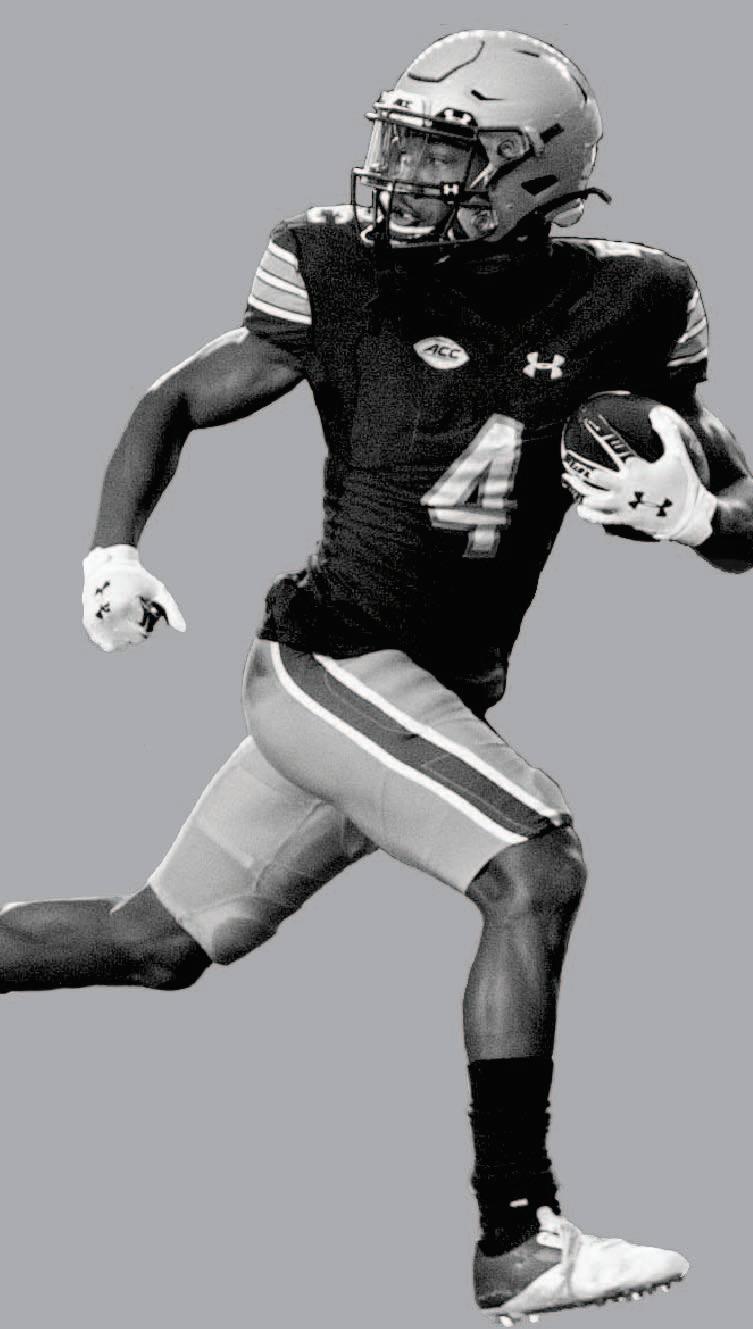
“When I came in, he was kind of a guy that they just used in a very small role,” BC football head coach Jeff Hafley said of Flowers. “I think it just took us a couple practices to realize the talent that he had. … When we saw what he could do we were very hopeful that he’d have a huge year. And he did.”
Throughout his 2020 season, Flowers totaled 892 yards on 56 receptions, nine of which were for touchdowns. He led BC in yards, touchdowns, and yards per game. He also finished with the Eagles’ longest catch of the year: a 77-yard touchdown against Pitt where Flowers used his speed to break away from a defender and beat him to the endzone.
A human highlight reel, Flowers made too many astonishing catches to count. One that comes to mind is his grab against Syracuse, where he somehow managed to get
his feet in before tumbling head-over-heels out of bounds and jumping up to celebrate the touchdown.
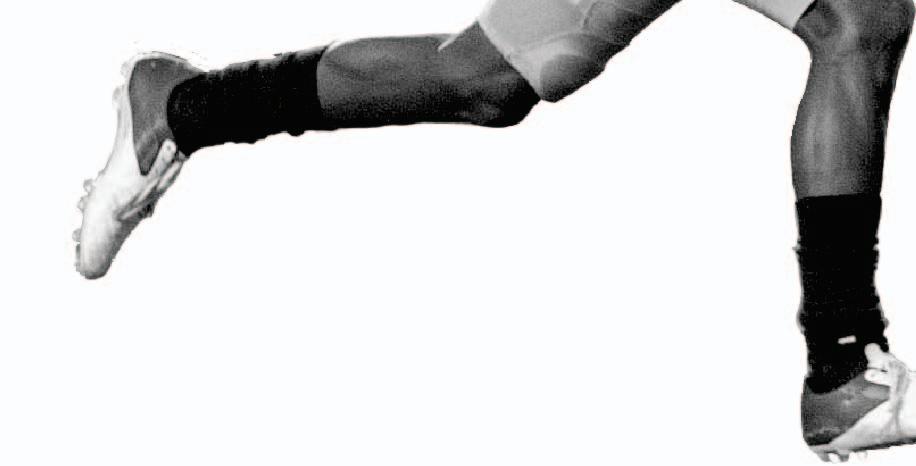
Another notable catch came against Clemson, where Flowers leapt into the air to grab a ball over a defender, caught it against his helmet, and came down in the endzone to give the Eagles an early lead against the No. 1 team in the country at the time.
Of course, there was also his overtime catch against Pitt.
Looking back on his 2020 season, Flowers points to that game-winning catch as one of his best of the year.
“Phil just put the ball in the perfect position for me to make a play,” Flowers said.
“Everybody just did everything together, and we just celebrated as a team.”
Even when talking about his best catches of the year, Flowers is still quick to credit his teammates. He also raves about the coaches, mentors, and family members who helped him get to where he is today. One such mentor is his father, Willie.
“My dad is my biggest source of motivation,” Flowers said. “He texts me every day … little messages to say, ‘Go hard, you can be better this year.’ … And they just keep me motivated because he believes in me and I believe in myself.”
One of 14 children, Flowers has plenty of brothers and sisters to help him stay motivated throughout the season. Although they were unable to watch games in person last year, they were right by Flowers’ side the whole time.
“[Not being able to attend games] was a little difficult, but it was okay because we pray a lot and I know the Lord has his back,” Willie said. “With technology, you know, you’re not there physically, but you can see him on the phone and through video a lot and you can actually talk to him however many times a day you want to.”
Although the Flowers family could cheer him on from all the way down in Florida, there’s something special about having a live, in-person fan base, Flowers said.
“I mean seeing them in the stands, that’s just going to make me happy,” Flowers said. “They also motivate me all the time, sending me stuff like, ‘Keep going, you’re going to make it.’ … They’re just there to support me in any way that I need.”
Growing up in a family with as much a focus on sports as Flowers’ has, not to
mention that he has too many siblings to count on both hands, it seems like it would be easy for his talent to get lost in the shuffle.
According to Willie, however, Zay’s skill was evident from a young age.
“I would say seven, eight years old,” Willie said. “I’ve got a lot of boys, and in looking at all of them play sports you can see a certain factor. … He had that ‘it’ factor.
… He always got the job done.”
In high school, Flowers was a two-sport athlete. When it wasn’t football season, he could be found on the basketball court and even considered pursuing basketball in college.
“Zay was actually a better basketball player,” Willie said. “Believe it or not, I thought he would choose basketball, but he said he loved football more.”
Once he made the decision to pursue football, Flowers—a three-star recruit out of University School in Fort Lauderdale, Fla.—had plenty of college options to weigh.
“I wanted something new,” Flowers said. “I really liked the city, and the first thing I was thinking about was education. Education was the most important thing, then we looked at football, then we looked at somewhere I could play early, and all three of those things matched up perfectly and put me here, and it’s a great city. It’s a great school.”
At just 21 years old, Flowers has a long football career ahead of him. To prepare for next season and the road ahead, Flowers said he has been honing his route-running ability.
“I’ve been working on that a lot—better technique, the small stuff,” Flowers said.
“Not really anything crazy, just detail. I’m trying to lead the receivers, because everybody’s doing their part and everybody is doing great. We’re gonna take it to another notch, when it’s time for the season.”
Flowers also said that he has been working on his conne as 2020 was the first time the two have played together.
“I’m trying to get [Jurkovec] to come down to Florida and show him what real football is,” Flowers said.
In a list of early 2021 Heisman Trophy odds, Flowers was ranked No. 20. As one of the most senior members of BC’s offense, Flowers will undoubtedly be expected to help lead the 2021 squad.
“He is always a positive person,” Willie said. “He’s been like that … since seven, eight years old. He pretty much hasn’t changed. He’s a very positive, humble guy.”
Hafley had similar things to say, citing Flowers’ ability to keep practices lighthearted and stay positive.
“He just lights up a room,” Hafley said. “He’s always in a good mood, he has a ton of energy, he’s a great presence. He has this big smile that just makes you smile. He’s a serious guy when he has to be, he knows when he can have fun, he practices at an extremely high level, he’s very motivated. … He’s just got this great presence about him.”
as he is, Hafley said Flowers knows how to keep practices lighthearted when appropriate. One way is through making bets with Hafley.
lot of days in practice where I’ll jokingly make [Flowers] a fun, friendly bet and say, ‘You’re not going
contributor to its success.

Hunter
out
“That’s his dream, that’s what, that’s what he wants,” Willie said. “He was saying that at a young age, and he really believes in himself and I believe too. I know he can do it.”
in 2021, and Flowers should be a major
beyond to fill the role, building on his stellar 26-point freshman campaign to tally 31 during his sophomore year and finish sixth in the nation in assists per game.
Boldy came through over and over again when the Eagles needed him most, as exemplified by his staggering four-assist display against UMass Lowell in the Hockey East Tournament semifinals. As Spencer Knight and the Eagles’ defense stumbled down the stretch, Boldy put the offense on his back in an ultimately unsuccessful effort to will BC
Boldy also notched a pair of assists in the first round of the Hockey East Tournament against New Hampshire. During the regular season, UMass Lowell was the unfortunate recipient of another one of Boldy’s most potent displays on the ice, as he also racked up four assists against them in the Eagles’ 7-1 destruction of the River Hawks.
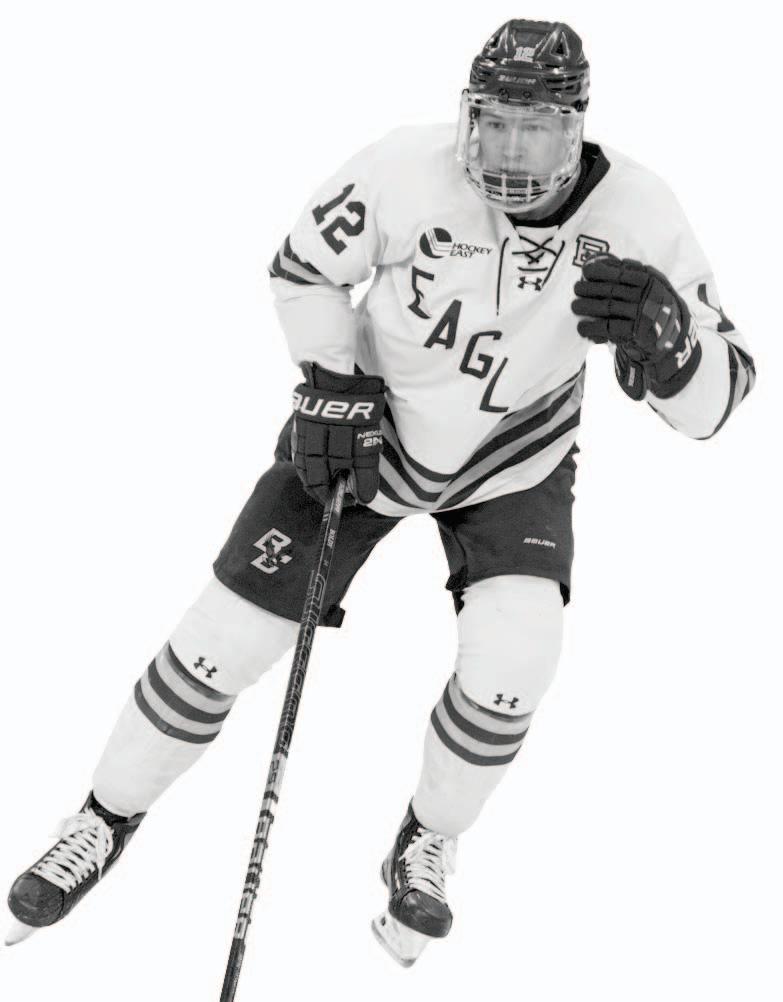
The creative play and passing prowess come as no surprise to Dan Donato, head hockey coach at Dexter Southfield School, where Boldy began his high school career.
“He has incredible vision, he knows where the other four guys on his line are at all times, and he has the confidence to make plays and try things,” Donato said. “I would say the thing that separates him is Matt makes his teammates better every time he steps on the ice.”
To limit Boldy’s contributions to the sport of hockey over the last season to simply his play on the Heights would be disingenuous. Over just this past season, he has dazzled across three different competition levels and one international border.
In mid-December, Boldy—along with Newhook, Knight, and Drew Helleson—departed the team for the IIHF World Junior Ice Hockey Championships, with Boldy, Knight, and Helleson lining up for Team USA and Newhook slotting in for Team Canada.

“It was definitely weird leaving but it was kind of something I dreamed about my whole life, always what I wanted to do,” Boldy said. “I always wanted to be a part of that tournament
… and win a gold medal. So, having a chance to do that, it’s really hard to pass up.”
Boldy’s golden dreams came true, as Team USA defeated Team Canada 2-0 in the title game to claim the championship. He was instrumental in the Americans’ success in the tournament, ranking fourth on the team with seven points and putting together some truly ridiculous highlights in the process.
“It was an unbelievable experience,” Boldy said. “The tournament was incredible, again, to win gold with the group of guys that we had. I’d grown up playing with so many of those guys and against them and with them again at the National Development Program.”
Boldy, who hails from Millis, Mass. and grew up an Eagles fan, attended Dexter Southfield for one year before joining the Michigan-based U.S. National Team Development Program.
“You obviously get attached to them and their families in that sense, so it’s hard sometimes to see a kid leave,” Donato said. “But my job is to do what’s best for the kid and the family and so [I’m] really happy for Matty.”
A host of other Eagles also came to the Heights from the program, including Knight, Helleson, Patrick Giles, and Marshall Warren.
While his experiences both at BC and at World Juniors came alongside a host of familiar faces, Boldy’s latest hockey move has put him among a new cast of characters.
Drafted 12th overall by the Minnesota Wild in the 2019 NHL Draft, Boldy decided to make the move to the professional ranks after the conclusion of the Eagles’ 2020-21 season, signing a three-year deal.
Hardman, Newhook, and Knight made the jump up to the pros at a similar time to Boldy.
“[Going pro] is a pretty personal decision, you definitely don’t want to make your decision because someone else is making their decision,” Boldy said. “It’s a really personal decision that you have to make and really commit to.”
The Iowa Wild, Minnesota’s AHL affiliate























He scored a screaming slapshot in his first game on the Wild and has shown no sign of slowing down since, notching over a point per game in his 10 games in the AHL.
With the Minnesota Wild sitting comfortably in playoff position after winning eight of its last 10 games, a potential late-season call up to the top team would put Boldy on a hot team that could make a deep postseason run.
“They just look so dominant out there, and they’re playing such good hockey that it’s really fun to watch,” Boldy said. “And that’s something that I get excited about, just knowing that I have the opportunity to go into an organization like that where you have a good team, you have great coaching.”
If the quick success of the rest of the Eagles’ cadre of new professionals is any hint, Boldy’s eventual transition to the NHL should be smooth.
Despite the quick success he has found in the AHL, Boldy couldn’t help but lament how factors outside of his control limited his college playing years.
“That made the [going pro] decision pretty hard, because I grew up coming to games with full student sections and stuff like that, and I never really got that full experience,” Boldy said.
While Boldy is still taking BC classes and has proved adept at translating his play to new environment after new environment, he said there’s nothing quite like the experience of playing collegiate hockey.
“At BC, [there is] kind of a little community that we have there, and kind of having that atmosphere at Conte with all the students and stuff like that, it’s almost like a little town there,” Boldy said. “You get that a little bit with the fans [in the AHL], but it’s not the same as it is at school."
A11 THE HEIGHTS MONDAY, MAY 3, 2021
Long—Flowers’ teammate and runner-up for most receiving yards through-
2020—was recently drafted by the Miami Dolphins. With some luck, Flowers should be hearing his name called in an upcoming NFL Draft as well, and his childhood dream of playing in the NFL will be realized.
ASA ACKERLY Assoc. Sports Editor
Final result be damned, Boston College men’s hockey looked infallible in the first period of its NCAA Tournament clash against
the puck from a scrum on the boards, turned toward goal, and easily slotted it past goalie David Hrenak.
A bevy of similarly stellar plays that propelled BC men’s hockey’s impressive season earned Boldy the 2020-21 Heights Male
on which Boldy began his professional career, does not have any other former National Team Development Program skaters on its roster, but Boldy has proved more than up to the task of adjusting to new teammates and a higher level of play.
se every oing nna her sealso ’s a nows tices he’s tgot him.” tive said ow s eep d apate. way ough g ’s a tice n gl g y say, oing y y p t p p o o t c B M s a E i g t
IKRAM ALI / HEIGHTS EDITOR
A1
IKRAM ALI / HEIGHTS EDITOR
Flowers, from
BY EMMA HEALY Sports Editor
Of all the things you’d expect to find in Fish Field House during Boston College’s preseason football team meetings, a basketball hoop is not one of them.
Yet, lo and behold, there it was, practically every day of the summer of 2020. Head coach Jeff Hafley and his staff ritualistically rolled the cumbersome hoop out onto the turf, and there it loomed, awaiting its next challenger.
Hafley would take turns picking a player or two, or maybe even an assistant coach, out of the physically distant crowd to go head to head in a basketball shooting contest—a sport that, in all likelihood, made them look like fish out of water.
“We just had to try to keep it light at times,” Hafley said. “I mean, with everything going on in the world, and COVID, and not being home … we just had to find ways to do other things, and I think we did a good job of that.”

While training camp in a normal year is usually spaced out throughout the summer, the COVID-19 pandemic made it so that this year, the Eagles went without seeing their families or “leaving their bubbles,” as Hafley described it, for months at a time.
“It probably felt like the longest training camp—the longest summer—in the history of football,” Hafley said.
Day after day, players would exhaust themselves in grueling practices, according to Hafley, and without the chance to venture off campus, there was little in the way of blowing-off-steam activities.
Thus, pre-meeting basketball was born. The ritual has since morphed into a number of new intrasquad competitions—including wiffle ball and O-Line punt-catch competitions—fostering community and a competitive spirit in a largely disconnected year.
Hafley arrived at BC with the obvious intent of righting the ship of a program that had previously been stuck in perpetual mediocrity through internal competition. And the solution, apparently, started with intramural games.
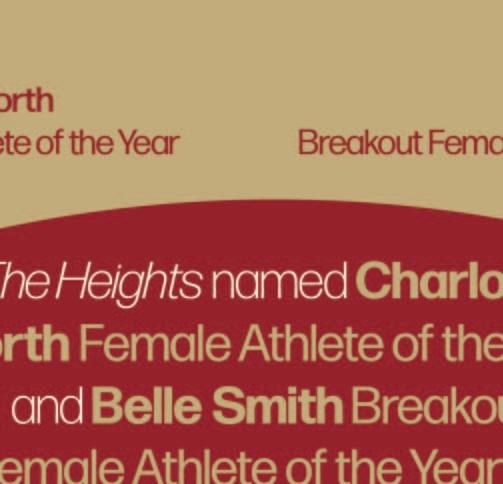
Though Hafley said wiffle ball perhaps isn’t his strong suit (“Usually I strike a few out, and I’ll give up some home runs,” he said), his adept ability to connect to his players and begin the arduous process of reversing the program’s course earned him The Heights’ 2020-21 Coach of the Year honor.
For as young as he is—the 42-year-old coach is one of the youngest in the FBS head coaching scene—Hafley is in no way short on experience. He’s got two decades of coaching under his belt, both at the collegiate level and in the NFL. In that time, he said, he’s learned a little something from every coach he’s worked with.
“Some coaches I’ve taken some great ideas [from], and other coaches, you know, I didn’t like what we did so I’ve created my own things,” Hafley said. “In my opinion, I’ve taken all the things that I’ve seen over the years and tried to formulate who I am as a head coach and how I want to run things in my philosophy.”
Hafley rattled off a list of a dozen coaches and what each of them has taught him, including big names such as Kyle Shanahan (“the details in his schemes”), Mike Pettine
(“one of the best defensive coaches I’ve been around”), and Dave Wannstedt (“the way he treated his players and staff”).
Whether he realizes it or not, though, Hafley serves that same teaching role for his current staff.

“That’s what I do with Coach Haf every day,” BC defensive coordinator Tem Lukabu said. “I’m just learning off of his experiences, learning off of the decisions that he has to make, how he structures things, organizes things, and try to see how they would fit me or suit me moving forward.”
Hafley and Lukabu first met on the recruiting trail in 2008, according to Lukabu, and three years later, the pair—now the best of friends—worked together at Rutgers under Greg Schiano. Both worked on the defensive side of the ball, building the ninth-best passing defense in the country, which is where they’ve focused their careers since.
As BC’s head coach, though, Hafley’s had to learn how to adapt to essentially being in three places at once.
“On game day, I’m so involved in the defense and what’s going on and the adjustments,” Hafley said. “All of a sudden, I’ll realize I’m the head coach, and I’ve got to switch over to the headsets and go be with the offense.”
Though he describes the transition from phase to phase as somewhat hectic, it’s not the way Hafley comes across on the field.
From the Alumni Stadium press box six stories above the field, Hafley appears to pace coolly and almost ritualistically up and down the sideline. He rarely ventures onto the field, and he doesn’t even require a “get back coach” like the one that famously accompanies Los Angeles Rams head coach Sean McVay.
Whatever frenetic energy is undoubtedly coursing through Hafley’s veins on game day doesn’t present itself on the field.
“He’s really calm,” Lukabu said of Hafley’s appearance on game day. “He takes in information and he doesn’t just react. I think he gets the whole picture before he does say something or do something, and that’s his personality. He’s not reactionary.”
When he arrived at BC in January 2020 just days after leading Ohio State on a run for the National Championship as the Buckeyes’ co-defensive coordinator, Hafley inherited a program stuck in a holding pattern of middling-at-best seasons.
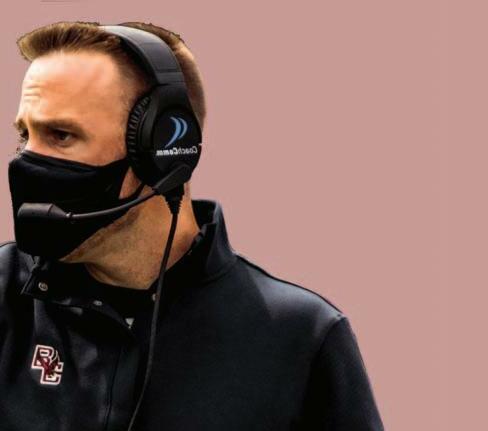
In recent years, the BC program had depended on the talents of AJ Dillon in a run-first offense to little avail. In seven seasons under former head coach Steve Addazio, the Eagles never once registered more than seven wins. Plus, when Hafley arrived, Dillon had just declared his entry into the 2020 NFL Draft, making a shift to a pro-style game that much more important.
The turnaround Hafley created was almost immediate, though it isn’t apparent in the Eagles’ 6-5 record for the 2020 season. Instead, Hafley brought with him a shift in culture, both within his team and across the Heights. His “Get In” mantra created an immediate surge in season ticket sales, according to then-athletics director Martin Jarmond.
“We sent a letter to all of our donors and alumni, we had an appeal for our season ticket holders, and it’s been a great response,” Jarmond said at Hafley’s introductory press conference. “A couple hundred season ticket holders already and donations in six figures
already. A lot of emails from people saying ‘I’m going to come to a game, and I haven’t been back in four years.’”

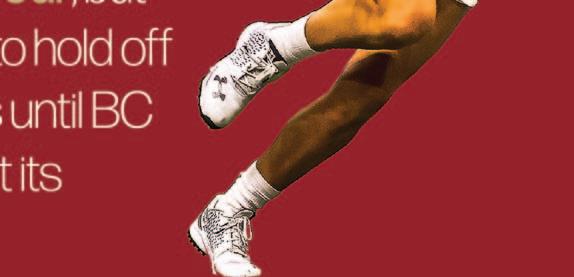
While the COVID-19 pandemic prevented those season ticket holders from cashing in on attendance this year, Hafley was also the catalyst in bringing life back to a defunct program. The shift began, he said, with the players.
“I would say that the players probably saw that we genuinely wanted to get to know them and we cared about them,” Hafley said. “I think if you’re ever going to lead anybody, you’ve got to get to know them, and you’ve got to show them you care about them.”
Unlike some head coaches who sequester themselves from the grunt work and focus on the bigger picture, Lukabu said that Hafley spends practice with blocking pads strapped to his arms taking hits just like the position coaches.
“The energy part of it, he can’t help himself,” Lukabu said. “He wants to be around the guys, he wants to be around the players, he wants to be amongst the coaching staff.”
His athlete-first focus has manifested itself in BC’s meteoric rise in the national recruiting rankings. The class of 2020 was
“That’s one of the things that I did love knowing coming into this situation: I knew that [family] is something that rounds him out,” Lukabu said of Hafley. “There’s a lot of guys that end up getting into football too deep and you lose yourself, and that’s not what he believes in.”
Days after Hafley arrived in Chestnut Hill for good, he donned a BC men’s hockey jersey and appeared in front of a standing-room-only crowd at Conte Forum.
“The ACC is gonna start to have a lot more rivalries than they think they do,” he said, which was met by thunderous cheers from throngs of BC fans.
That sentiment was an echo of his introductory press conference weeks earlier, when he told a crowd of media, alumni, and athletics personnel that he intended to build a cul-
mni, tic s l that nded uild a
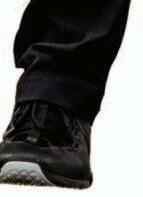


ture of competition. That attitude has driven almost every decision he’s made at the helm, whether it’s a head-to-head battle for starting spots or small-sided basketball games in Fish Field House.
“Our bottom line is we have a culture that’s competitive, and it comes down to competing in everything we do,” Lukabu said. “And that’s just another way that … Coach Haf as the head coach instills in the guys that everything’s about competing and winning.”
With the end of spring practice last week, Hafley has plenty of time to work on his wiffle ball pitching. But he’s got more pressing matters on his mind.
ranked 62nd nationally, the class of 2021 is 37th, and the class of 2022 is all the way up at No. 16, including second in the ACC—the highest-ranked recruiting class in BC history—with no signs of slowing down.
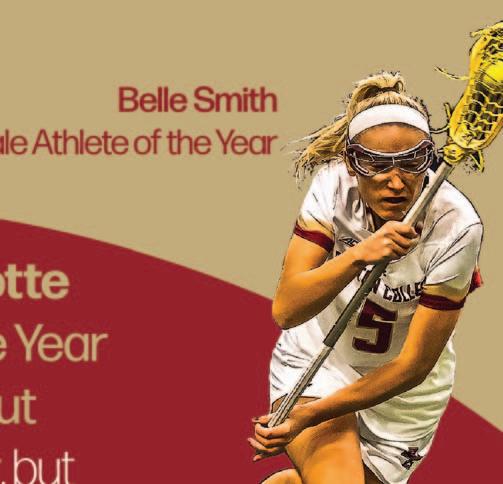
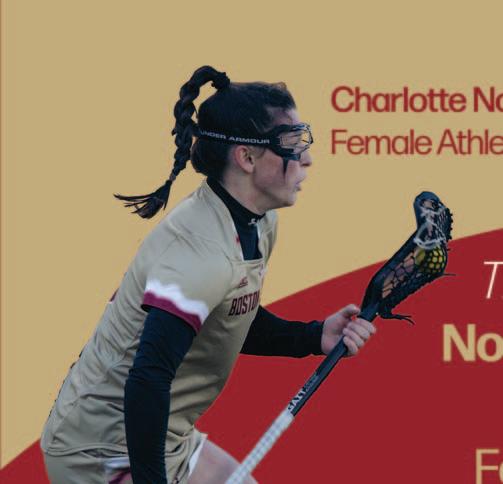
Since he was a senior in college, Hafley has kept a list with him of all the people who have doubted him and the words they’ve levied against him. By now, the paper is yellow and the ink is fading, but the meaning remains unchanged.

“A lot of people thought that I could never do what I set out to do, and you know, it’s not their fault,” Hafley said. “It motivates me still now, probably not as much, but there are certain people out there that don’t think we can win here [at BC] and don’t think we’ll ever win big here, so that motivates me.”
The external motivators, however, pale in comparison to Hafley’s internal drive.
“I wake up every single morning and love coming to work,” Hafley said. “I love the people I work with. … I don’t need motivation to wake up every morning because I want to help these kids grow and succeed in everything they do in life, and I want our staff to succeed.”
He talks about his players and staff in almost the same glowing cadence as when he talks about his wife, Gina, and his daughters, Hope and Leah. “Almost” is the operating word, however, as there’s a special reverence in his tone that’s reserved only for his family.

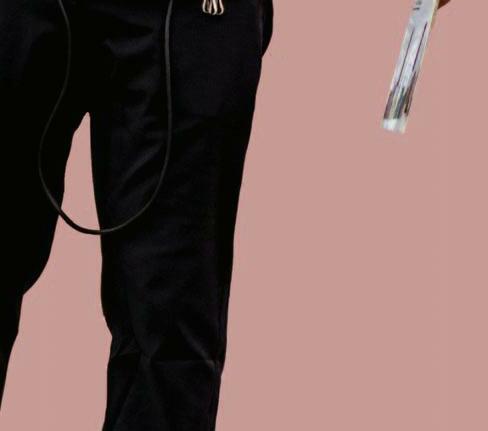
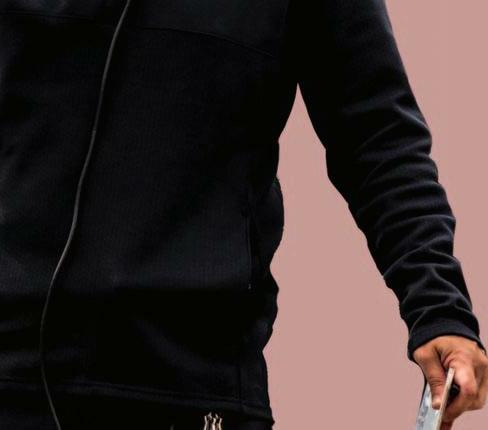

“[My wife] probably deserves more credit than I do because she has a harder job than I do,” Hafley said. “I’m very fortunate to share this journey with her. I think, without her support, there’s no way that I’d be where I am right now.”
With so much of his life revolving around his family, Hafley said it’s his goal to get not only his wife and daughters involved with the team, but for all of the staff to bring their families along for the ride.
future,” now, make k

“I’m never gonna look too far in the future,” Hafley said. “Right now, I have to make a lot of decisions that might affect the future. Right now, the players who are here … those are the guys that are the most important. That’s it. … Hopefully, if we continue to do that and just build it the right way and be ourselves and be fearless and confident, everything
be fearless and confident, is going to take care of itself.”
A12 THE HEIGHTS MONDAY, MAY 3, 2021
onal class l f 021 i s e
BY MEEGAN
/ HEIGHTS
PHOTO COURTESY OF BC ATHLETICS
GRAPHIC
MINAHAN
EDITOR





















 BY ERIN PENDER Heights Staff
BY ERIN PENDER Heights Staff

















































 B Y G RACE M C P HEE Heights Staff
B Y G RACE M C P HEE Heights Staff


 PHOTO COURTESY OF NETFLIX
PHOTO COURTESY OF NETFLIX

























